#midoriya izuku meta
Text
I love love love how Plus Ultra for Deku goes hand in hand with him learning to protect himself.
It was said by Aizawa and Recovery Girl, how a hero couldn't be that self-destructive because it'd end badly. It was emphasized after the War arc, when Deku got saved by his friends and they got mad about him leaving them behind. It is a constant even now on the current arc, with the Vestiges helping him stay focused and reminding him he can't just go all out and sacrifice himself.
If you die, it's game over. You can't help anyone else, can't rescue others, can't contribute to a happier society.
Even from the first chapter, when Bakugo told him to kill himself and All Might rejected him, something in Deku knew it was not the solution. Giving up wouldn't help, it'd mean nothing.
But moving forward and beyond, learning more about his own abilities and trusting himself, that'd do it.
Who else would have saved Bakugo if not him?
#bnha#mha#boku no hero academia#my hero academia#Deku#Midoriya Izuku#Shan's bnha meta#Shan's mha meta#Mha meta#Bnha meta#Midoriya Izuku meta#Bnha spoilers#Mha spoilers
78 notes
·
View notes
Text
i don't like the growing opinion that people are being 'too hard' on deku for his failing to save shigaraki.
i've seen quite a few people complaining that a lot of the bnha-critical crowd are being too mean to deku for getting tomura killed, arguing that it isn't really his fault, and that hes a 16 year old child soldier who's been failed by almost every adult in his life, why should we be putting all of this on his shoulders? hes just a kid after all?
and the truth is, they're right. deku IS a 16 year old boy whos had the fate of the world thrust on his shoulders. but the story itself just plainly refuses to acknowledge this.
the narrative doesn't acknowledge how fucked up having a school that trains literal children how to be combo cop-celebrities is. it only tentatively acknowledges the fact that a universe having combo cop-celebrities is fucked up, and even then the only people who ever point this out are antagonists, who are portrayed and treated in-universe as untrustworthy. the narrative doesn't care how fucked up dekus circumstances are. the narrative treats deku like hes a fucking messiah here to touch the hearts of the evil depressed villains with his magical empathetic heart of gold before they get blown up or just sent to fucking superhell for daring to challenge the status quote.
deku isn't a person. he's barely even a fucking character at this point. he's a plot device, and a mouth piece for the objectively shitty themes bnha is trying to spout. the themes that tell you that if you're mistreated by society and want to do something about it, you're a villain. that disrupting the status quote and refusing to repent to some random teenage boy spouting empty platitudes at you means you deserve to get sent to fucking superhell. the themes that portray people fighting for civil change as mass murdering supervillains. the themes that look the audience dead in the eye and can call deku the greatest hero to ever live.
deku, who barely spared a second thought to lady nagant telling him the truth about the hero commission. who spouts meaningless platitudes about heroism and morality at nagant, and aoyama, and toga and shigaraki, when even the thought that he should question the world around him comes up. who's constantly talked about as this truly kind, empathetic person, but hasn't spared an empathetic thought to literally anyone who is classified as a villain. who listened to every authority figure around him except the ones who asked him to question his worldview. who saw la bravas tears, shigarakis various breakdowns, himikos plead for understanding, chisakis catatonic state, lady nagants truth, and barley batted a fucking eye. deku, who killed tomura shigaraki.
people don't criticize deku for failing shigaraki because they just hate deku. people criticize deku because of what he represents. because hes a mouthpiece for the atrocious morals and themes of this ideologically rotten manga. because any character he had was chopped up to bits in favor of the incomplete husk we have now. people criticize deku because hes the main character of my hero academia. theres nothing more damning then that.
#my post#bnha#bnha critical#izuku midoriya#midoriya izuku#sorry if this sounds really angry. i mean i am very angry at bnha for being such a nothing burger of empty platitudes and wasted potential#but like. that was extremely predictable#bnha wanted to be more than it was willing to put effort into being and so now its just. worthless#so this is just kinda a vent on all my angry feelings abt dekus failure as a character and a protagonist#tomura shigaraki#my hero academia#boku no hero academia#mha critical#my hero acedamia critical#boku no hero acedamia critical#deku#bnha meta#i mean techinally#mha#mha meta#bnha manga spoilers#bnha manga#long post#well longish
1K notes
·
View notes
Text
You know, I think this ending would have been slightly less of a fucking disappointment if the heroes hadn't been so unfairly favored by Horikoshi compared to the villains. I mean, seriously
Deku destroys every bone in his body multiple times throughout the story and is warned that if he continues, he'll permanently lose the use of his limbs ? Everything's fine, his body's just got used to being reduced to a bloody pulp somehow so there's no consequences for him. In fact even when he literally loses his arms to Shigaraki, he gets them back two minutes later thanks to Eri because guess what ? Her horn still works even when cut off from her body. How convenient.
Gran Torino gets his ribcage obliterated by Shigaraki ? Don't worry guys, he'll survive that despite his old age and injuries, and this to have no particular role in the plot afterwards.
Bakugo dies heroically trying to buy time before Deku arrives ? Lmao, did you really believe it ?? No of course not, Edgeshot just uses his last-minute Deus Ex Machina to save his life at the cost of his own and- Oops nope he's fine too, my bad !
Hawks murders a criminal fleeing for his life in cold-blood ? The best Hori has to offer is him completely free and in charge of the HSPC.
And no, losing his quirk isn't a real consequence for him because not only it literally played a major part in saving the world with Vestige!Hawks raising an insurrection among AFO's quirks, but also because his quirk has always been the element through which people exploited him.
Endeavor abused his family for years and completely destroyed his eldest son ? No jail time and no media backlash for that, the only blame he received was due to the heroes' failure to stop the League during the Raid Arc.
And don't even get me started on this bs about facing hell or whatever for what he's done : He's literally free and wealthy ; he have Rei, Fuyumi, Shoto, his sidekicks and Hawks on his side ; and all the difficulties he's apparently going to suffer are off-screened.
Deku had to sacrifice OFA and his future hero career to save the world ? Guess what, Bakugo invested all his time and money to make him an Iron-Man suit and now he can still be a hero with everyone else.
There are plenty more examples of this but I think you get the idea. Now let's take a look at the villains' ending :
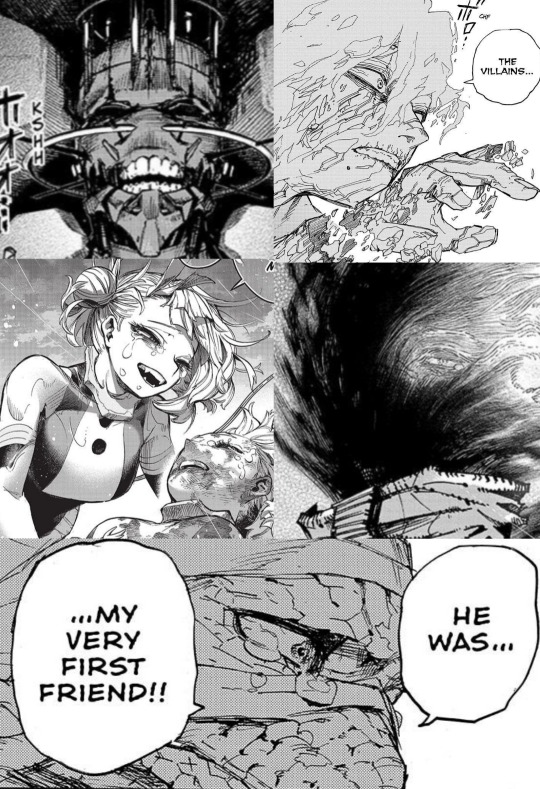
Toya is now a piece of charcoal kept artificially alive for the few years he has left, unable to move a finger, and whose few minutes a day during which he can stay awake will be spent talking to his father who abused him as a child.
Toga, a literal teenager, killed herself to save Ochako and because she knew it's still better than rotting at Tartarus her whole life.
And not only did she die but she did by bleding to death. Let me repeat for those who have trouble grasping what I've just said : In a manga where the heroes can survive having their heart blown to bits, being impaled Kakyoin-style or smashed against buildings like a fly on a windshield, one of the main antagonists died of a fucking hemorrhage…
As for Shigaraki, after learning that his very birth and all the tragedies of his life have been orchestrated by AFO, after all this development and narrative promises about him being saved in the end... Deku just kills him.
Because despite all his speeches about saving him, it seems like the best he could do was beating him both physically and mentally until he crumbles to dust…
Compress on his side is apparently locked up for life and kept alive by machines too.
A begging Kurogiri tried in a desperate attempt to save Shigaraki, only to be unceremoniously blown up by Bakugo and dying off-screen without anyone giving a shit, including Aizawa and Mic.
And Spinner will now spend the rest of his life struggling with the extra quirks inside him that affect his body and mind, while having to cope with the thought that his boyfriend best friend and companions have either died alone or are locked away for life in horrifying circumstances.
Clearly not the same as with the heroes...
Now don't get me wrong, even if they suffered just as much from the consequences of their actions or the plot as the League, this ending would still be a disaster in terms of writing but AT LEAST it wouldn't reek that much of hypocrisy.
#bnha spoilers#bnha 430#bnha#mha 430#bnha epilogue#endeavor#enji todoroki#izuku midoriya#tomura shigaraki#jin bubaigawara#toga himiko#shuichi iguchi#kurogiri#dabi#touya todoroki#hawks#takami keigo#league of villains#bnha meta
789 notes
·
View notes
Text
A Reminder about MHA’s last chapter
Dear MHA fandom, the leaks never said that Class-A lose complete contact with Izuku for the last 6 years, only that they haven’t been able to see eachother because of scheduling conflicts. TEXTING, CALLING, AND VIDEO-CHATTING ARE STILL A THING. FOR ALL WE KNOW THEY’VE BEEN TEXTING 24/7 SO PLEASE STOP REACHING SUCH AN INSANE CONCLUSION WHEN THATS LITERALLY NOT THE CASE.
Translations say they “haven’t had enough time to get together”, which means seeing each other in person. It doesn’t mean anything about other forms of communications. Long-distance relationships happen all the time. Dont you remember still keeping in touch with others after moving away or after highschool/college? It’s the same case here.
So, let’s all take a deep breath, no matter who you ship or care about most, and remember that these kids all care about eachother and nothing can change that.
#bnha deku#bnha#midoriya izuku#bnha spoilers#izuku midoriya#my hero academia#boku no hero academia#mha#bnha meta#bnha analysis#deku#bnha manga spoilers#bnha 430#mha 430#bnha 430 spoilers#class 1a#bnha class 1a#mha class 1a#bakugo katsuki#bakugou katsuki#urakara ochako#ochako urakara#shoto todoroki#shouto todoroki#tenya iida#iida tenya#kirishima eijirou#eijirou kirishima#Deku#izuocha
678 notes
·
View notes
Text
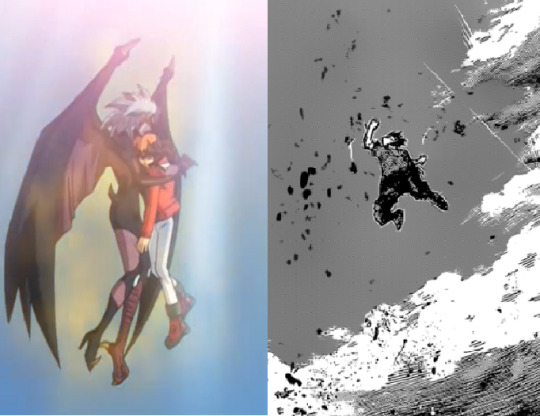
SHIGARAKI VS. YUBEL: HOW TO SAVE YOUR VILLAIN
The failure of Deku to save Shigaraki isn’t just a tragic conclusion for Shigaraki’s arc, it’s also My Hero Academia failing as a story. When I say the story failed, I mean the story has failed to answer any of the questions it asked its audience. It’s themes, character arcs, everything that communicates the meaning of the story to the audience is no longer clear.
Saving Shigaraki was the central goal of not only the story itself, but the main character Deku. By failing in its goal you can’t call this a good ending. In order to illustrate why this goal of saving the villain is so important to both Deku’s character and the central idea of MHA, I’m going to provide a positive example in Yu-Gi-Oh GX were the main character Judai successfully saves their villain.
One of these stories fails, and the other succeeds. I will illustrate why under the cut.
BROKEN THEMES = BROKEN STORY
When artists draw they have to consider things like perspective, anatomy, shading, light, coloring. Drawing has rules, and it’s hard to produce good art without knowing these rules beforehand. If I draw something that has bad anatomy, you can criticize me for that.
Writing has rules, just like drawing. The rules of storytelling are important because writing is an act of communication. You can write whatever you want, just like how you can draw whatever you want, but if you break the rules the audience won’t understand what you are trying to communicate.
When I refer to MHA as a broken story, I am referring to the fact that it has broken the rules of storytelling. As this youtuber explains.
“I guess we should first define what broke and broken even means in this context. Has the story turned into an unintelligible mess? Not really. Value judgements aside, the narrative is still functional and fulfills the criteria of being a story. So how can a story that still functions be broken? Maybe to you it cannot. But to me a story that is still functional isn’t enough. What I mean when I say MHA is broken is that it’s lost something crucial. A codifying style of structure, pacing and payoff that until a certain point was the core of its identity.”
I could launch into a long-winded explanation of what themes are, but for the sake of simplicity I like to define themes in terms of “Ask, and answer.” The author asks a question to the audience, and then by the end of the story provides an answer. The audience is also invited to come up with their own answer which prompts them to think about the story on a deeper level.
The question both MHA and GX are asking both its main characters and the audience is “Can you save the villain?” with the additional complicated question of “Should you save the villain?”
This post will detail how both stories go about answering those two questions, and more importantly why those answers matter for the story.
With Great Power… You know the rest.
My Hero Academia and Yu-Gi-Oh Gx are actually similar stories once you get past their superficial differences. MHA is a story with way better worldbuilding, compared to a society where everything revolves around the trading card game, and people go to school to be better at a trading card game.
However, if you get past that. They are both bildungsroman, stories about the main characters growing up into adults. They both have an academy setting where the goal is for the main character to graduate and enter the adult world. They are both shonen manga. GX is the sequel of Yu-Gi-Oh a manga that ran in Shonen Jump the exact same magazine as MHA.
The biggest point of comparison is their main characters, who both start out as young and naive who are driven by their admiration of heroes. Deku is a fan of All Might who wants to become a hero despite not having a quirk, because he loves All might who saves everyone with a smile. Judai’s entire deck archetype revolves around “Elemental Heroes’ and later “Neo-Spacians” who are all based on popular sentai heroes like ultraman.
The central arc for both characters is to grow up. Growing up for both of them not only requires figuring out what kind of adult they want to be, but also what kind of hero they want to be.
Now I’m going to drastically oversimplify what a character arc is.
A character arc first starts out with the character being wrong. Being wrong is essential because if the character is right from the beginning, then there’s no point in telling the story. A character often holds the wrong idea about the world, or has some sort of flaw that hinders their growth.
The narrative then needs to challenge them on that flaw. It usually sets up some kind of goal or win condition. That flaw gets in the way of a character “winning” or achieving their goal, so they need to fix that flaw first.
If their ideals are wrong, then they need to think about what the right ideals are. If they’re too childish, they need to grow up. If they have unhealthy behaviors or coping mechanisms, they need to unlearn it and require better ones. Otherwise, that flaw will keep sabotaging them until the end.
I’m borrowing the word “win condition” from class1akids here because it’s an incredibly appropriate terminology. Midoriya needs to do “x” in order to win, otherwise this victory doesn’t feel earned. The “x” in this case is usually character development. As I said before, a story where the main character hasn’t changed from beginning to end feels pointless. Especially in Deku’s case, he was already a brave, strong hero who would charge right into battle and defeat the bad guys in chapter one, so him defeating Shigaraki in a fist fight doesn’t represent a change.
The story sets up not only “What does the hero need to do to win?” but also “How does the hero need to change in order to win?” A character either meets these requirements before the end of the story, or they don’t and usually this results in a negative ending.
MHA in its first half quite clearly set up both the final conflict of saving the villains, and also that saving the villains is its “win conditions.” The hero shouldn't be allowed to win without first fixing this flaw.
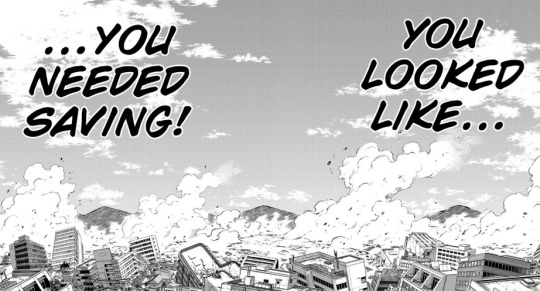
From this panel onward the central question Deku is forced to answer shifts from “Am I strong enough to defeat ShigarakI” to “Can I save Shigaraki?” However, much earlier than that All Might goes on to basically set up the win conditions of what makes the ultimate hero as someone who “Saves by winning, and wins by saving.”
All might: You can become the ultimate heroes. Ones who save by winning, and win by saving.
Therefore the story has set it’s criteria for what kind of hero Deku needs to become. If he wins without saving, then he’s failed to become what the series has set up as the Ultimate Hero.
Shigaraki and Yubel aren’t just narrative obstacles, or boss monsters to be killed like in a video game. They are narrative challenges, which means that the character can’t grow in any way if they don’t answer the challenge presented by the characters. They are villains who actively resist being saved, to provide a challenge for two heroes who define their heroism by saving others.
The challenge they pose adds a third question to the story and the main characters.
"Can I save the villain?"
"Should I save the villain?"
"If I don't save the villain, then can I really call myself a hero?"
In other words the decision they make in saving, or not saving their final antagonist defines what kind of hero they are. In Deku’s case it’s even more critical he defines what hero he wants to be because the MHA is also a generational story, and several of the kids are asked to prove how exactly this generation of heroes is going to surpass the last one.
The kids growing physically stronger than the last generation isn’t a satisfactory answer, Deku getting strong enough to punch Shigaraki hard is not a satisfactory answer, because we are reading a story and not watching a boxing match.
I’m going to focus on the last two questions though for a moment. Many people who argue against saving villains like Shigaraki argue he is a mass murderer and therefore isn’t worthy of salvation.
However, the act of saving Shigaraki isn’t a reflection of Shigaraki himself, but rather the kind of hero Deku wants to be. It all boils down to Spiderman.
In the opening issue of Spiderman, teenage Peter Parker is bitten by a radioactive spider and suddenly gains super strength, the ability to stick to walls along with other powers. However, being a teenager he uses these powers selfishly at first. He doesn’t feel the obligation to use his powers for other people, and therefore when he sees a robbery happening right in front of him he lets the robber go.
However, because he lets the robber go, the robber then attempts to hijack a car and kills his Uncle Ben in the process. If Spiderman had stopped the robber then he might have prevented that from happening. He had the power to stop the robber, but he didn’t feel responsible or obligated to save other people. As a result Uncle Ben dies. It’s not enough to have power, ti’s how you use that power that reflects who you are, therefore: “with great power comes great responsibility.”
The choice to save Shigaraki actually has little to do with whether or not Shigaraki is redeemable, but rather how Deku chooses to use his power, and what he thinks he is responsible for reflects who Deku is as a person.
Deku himself also clearly outlines how he wants to use his power, that One for All is a power for saving, and not killing.
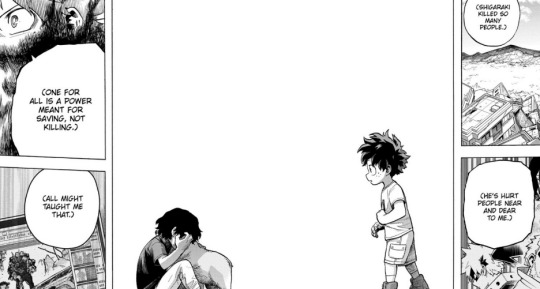
How he uses his power reflects Deku’s ideal in saving others, and therefore if he doesnt use his power to save, then he’s failed to live up to his ideals. It's not whether it's morally right to save a murderer like Shigaraki, but rather the way Deku wants to choose to use his power. It's about whether he feels the responsibility to save others.
Judai explores an incredibly similar arc to Deku. They are basically both asked what kind of responsibilities a hero is supposed to have, which is also a metaphor for growing up to handle the responsibilities of adulthood. As both characters start out with incredibly naive and childish ideas about what a hero is. Therefore realizing what a hero is responsible for is key to them growing as a character.
However, Judai is different from Deku. In some ways he’s more like Bakugo. Judai is a prodigy who’s naturally good at dueling. He doesn’t duel to save others, but rather because duels are fun and he’s good at it. He’s very much like Bakugo, who admired All Might as a hero just as much as Deku did, but admired the fact that he was strong and always won rather than he saved others.
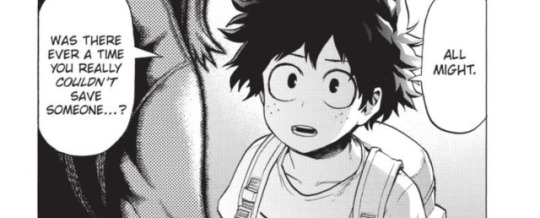
However, I would say both Deku and Judai are questioning what a hero is responsible for. They are both asking if they have the responsibility to use their power to save others. If they have to fight for other people, just because they have power.
His first big challenge as a character comes from Edo Phoenix, who calls out Judai for not thinking through what it means to be a hero, and what responsibilities heroes carry. Judai duels because he thinks it’s fun. He will show up to duel to help his friends, but that’s because he’s the most powerful person in the group. Even then it’s because he finds fighting strong opponents to be enjoyable. Bakugo will beat up a villain, but for him it’s more about winning then if the action will save someone or not.
Judai is more often than not pushed into the role of being a hero, he doesn’t play the hero because he’s a particularly selfless person, and he’ll often avoid responsibility if not forced. He has power but no sense of responsibility and the narrative calls them out as a problem.
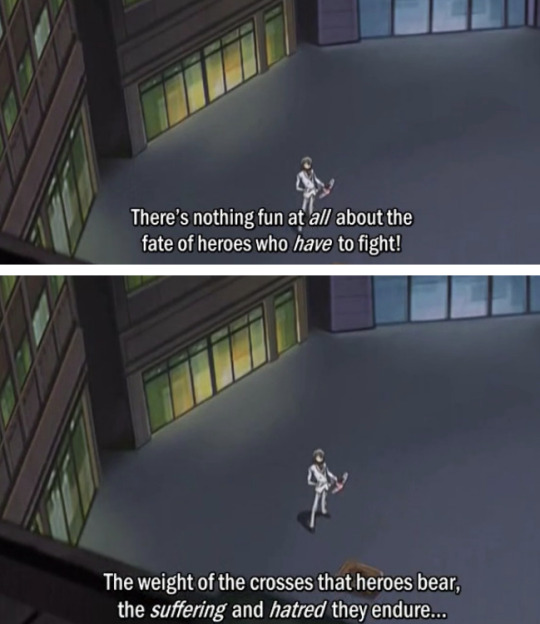
Edo: Can you even fathom that, Judai?
For Judai, he can’t understand the responsibility of being a hero. For Deku, he idealizes heroes so much he can’t understand that there are people out there the heroes have failed to save. These two callouts towards Deku and Judai are discussing similar because they’re both discussing where a hero’s responsibilities lie. Is a hero responsible for saving everyone? Is someone strong like Judai responsible for using their strength to help other people?
Judai’s arc continues into the third season where he’s not shown to just be naive but ignorant. He’s not just childish, he actively resists growing up because he doesn’t want to take on adult responsibilities.
THe same way that Deku just decides not to think about whether or not All Might failed to save people in the panels above. However, in Judai's case he's actively called out for his choice to remain ignorant.
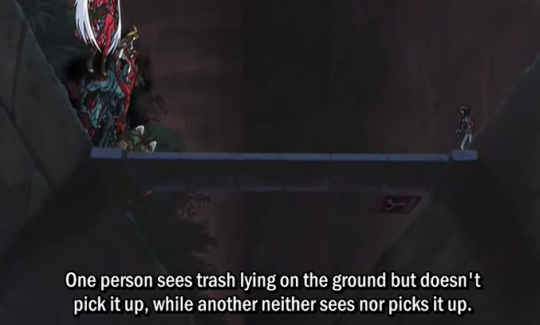
Satou: Now, which one is at fault?
Judai: Isn’t it the guy who saw it, but didn’t pick it up.
Satou: Not quite. If one is aware of the trash that fell, it may be picked up someday. But there is no possibility fo the unaware one ever picking it up. Judai-kun you are the foolish one unaware of the trash that has fallen.
Judai: Are you calling me out for how I am?
Satou: Your behavior towards me was atrocious. The worst was attending class only for credit, even if you were there you only slept.
Judai: Yeah, I know. I was all bad, but it wasn’t that big a-
Satou: It is important. You see, one by one, the students inspired by your attitude were losing their motivation. Now if you were a mediocre duelist, then this would not be an issue.
Satou: However, you are the same hero who defeated the three mythic demons. Every single student in the academy admires you. You should have been a model for this academy.
Judai: Me, a role model? Are you kidding? I just do whatever I feel like doing.
Satou: Great power comes with great responsibility. Yet, as you remain unaware of that, you’ve spread your lethargy and self-indulgence.
seems like a minor issue, but look how Judai responds to the accusations. “I just do whatever I feel like doing.” Satou is arguing that Judai should pay attention to the influence he has on others because of his power, because how he chooses to use that power affects others. However, Judai chooses to actively not look at the consequences of his actions because he doesn’t want to take on that level of responsibility, and therefore he’s looking away from the trash.
While it seems like it doesn’t matter in Satou’s specific example, not thinking of the consequences, or how you use your power can have unexpected consequences. Spiderman doesn’t feel like it’s his responsibility to stop a bank robber, and that bank robber shoots his uncle. You could still argue it’s not Spiderman’s responsibility to stop every crime in the world, and I guess no one owes anyone anything from that point of view - but Spiderman failing to act responsibility had the consequence of directly hurting someone else.
Spiderman has to live with that consequence because it was his own Uncle that was hurt.
This is where we really reach the duality of Judai.
In GX, Judai is, symbolically speaking, The Fool of the Tarot Deck, the Novice Alchemist — a person brimming with infinite potential, yet one who is also supremely ignorant, who walks forward with his eyes closed and often unknowingly causes harm in his great ignorance. In this, he is very much the embodiment of the faults we most commonly associate with teenagers — selfishness, recklessness, shallowness, a lack of dedication or empathy when it’s most needed. Like most people, he has good traits that work to balance out some of the above, but his narrative path through GX ends up being that of the flawed hero undone by his faults — and then that of the atoner, the repentant sinner. In his case, the mistakes of his teenage years are the catalyst for his growth from a boy into a man burdened with duty and purpose.
Judai is someone with infinite potential, with great power, but also ignorant on how he should use that power, and that makes him an incredibly flawed hero who needs to learn how that power should be used.
Deku similarly exists in a society where heroes deliberately turn a blind eye to the suffering of a certain type of victim. Shigaraki’s speech heavily resmebles Satou’s speech about garbage on the side of the road.
Shigarali: "For generations you pretended not to see those you coudln't protect and swept their pain under the rug. It's tainted everything you've built."
Deku shares Judai’s ignorance, because he’s not only a part of a system that doesn’t even see trash on the side of the road, but he also worships heroes so much that he’s incapable of criticizing them. If Deku saw the flaws of heroes, but at first didn’t have the courage to speak out, but eventually gained the courage that would be one thing. However, if he doesn’t see the flaws of heroes, then the problem will never be fixed.
There are also consequences for both Judai and Deku failing to use their powers responsibly. These consequences take the form of the villains who came about because of all of society’s ignorance to the suffering of victims (Shigaraki) and because of the main character’s ignorance to their suffering (Yubel). Shigaraki and Yubel are also explicitly victims that the heroes failed to save, turned into villains who are active threats to the heroes.
Should I save the villain?
The answer is yes, because the decision to save is reflective of the kind of hero each character wants to be. Each story clearly sets up that Deku and Judai aren’t punisher style heroes who shoot their villains, they are being set up as heroes who save.
Deku needs to “save by winning.”
As for Judai, a big deal is made of Judai’s admiration for another character Johan who represents a more idealistic kind of hero. Johan unlike Judai is someone who duels with a purpose, something Judai outright says he admires because he’s empty in comparison.
Judai: Johan what have you been dueling for? See, it’s about fun for me… Well, for the surprise and happiness too. I guess I do do it for the fun. Sorry, I guess I put you on the spot by asking out of nowhere.
Johan: What’s this about Judai?
Judai: It’s nothing.
Johan: I suppose there is one goal I have.
Johan: Even if someone doesn’t have the power to see spirits, they can still form a bond with a spirit. That’s why I do it for people like him.
[...]
Johan: I'll fight for everyone who believes in me, and I'll do it with my Duel Monsters.
Judai: I'm jealous you've got feelings like those in you.
Becoming a hero who uses their power to help others isn’t just a goal the story sets for Judai, it’s a goal that Judai sets for himself because of his admiration for Johan. Johan represents the idealistic hero Judai wants to be, but is also held back from because of his personality flaws. Johan represents the kind of heroic ideal that Deku is aspiring to be.
Johan’s ultimate goal isn’t punishing the wicked, but to use his power to save others.
Johan: Judai, it was my dream to save everyone through my dueling!
The story sets up the idea that it’s not enough for Judai to simply be strong, he’s also challenged to become a savior who uses his power to help others like Johan.
Deku needs to “save by winning” and Judai needs to “Save everyone through his dueling.” However, Johan also adds another condition to what saving means. His idea of saving isn’t to defeat a villain, but rather his dream is to help connect spirits and humans together, even if there are humans who can’t see spirits. Johan doesn’t save people with the power of physical force, but rather the power of human connection.
Should I save the villain?
Here the answer is "Yes", because wants to become more like Johan someone who uses their power to help others not just for themselves.
Then we reach the third question
If I don't save the villain, can I really call myself a hero?
It once again comes to power and responsibility. Heroes have great power, and they are responsible in how they use that power, if they use it irresponsibly then there are consequences. Shigaraki wants to destroy hero society, because the heroes irresponsibly use their power to turn a blind eye to everyone’s suffering.
People suffer when heroes fail to live up to their responsibilities.
The entire conflict of season 3 is created by Judai failing to save Yubel. If Judai had helped Yubel when they most needed it, instead of abandoning them, then Yubel would never have been twisted by the light of destruction, would never have attempted to teleport the school to another dimension, would never have attacked all of JUdai’s friends.
These consequences matter.
Deku can turn his eyes away from Shigaraki’s suffering, but let’s say a hero failed to stop a robbery, or rather he didn’t even try, and because of that his mom was shot and died in the street.
Would Deku consider the man who failed to stop a bank robbery a hero?
When Spiderman let a bank robber go instead of trying to stop him, was he being a hero in that moment?
Both the stories and the characters themselves have defined heroes as people who use their powers to save others, therefore if Judai and Yubel fail to save their villains then they can’t be called heroes by the story’s own definition. Now let’s finally return to the question of "Can I save the villain?"
Was there ever someone you couldn’t save?
m going to start with Yu-Gi-Oh Gx as a positive example of how to save your villain.
Gx works for two reasons. One, it’s established from the start that Yubel isn’t beyond salvation, and two, it makes it so Judai can’t win without saving Yubel. The conflict of the story does not end until Judai makes the decision to save Yubel.
In some ways the writing is even stronger because Judai is directly responsible for the pain and suffering that Yubel went through that turned them into a villain in the first place. Yubel isn’t just a victim, they’re specifically Judai’s victim.
Yubel is a duel spirit who is also essentially Judai’s childhood friend. A duel spirit just like the kind that Johan wants to save. During their childhood Yubel got too overprotective of Judai, and started to curse his friends for making him cry or upsetting him in any way. Until everyone Judai’s age started avoiding him and Judai became all alone with only Yubel for company.
Judai’s decision was to abandon Yubel at that time. He took the yubel card and shot them into space, hoping that being bathed in space rays will somehow “fix” what was wrong with them. I know that’s silly but just go with it. Judai abandoning Yubel had the unintended consequence of Yubel being subjected to the light of destruction, a corrupting light that subjected Yubel to years of pain. This pain literally takes the form of Yubel burning alive.
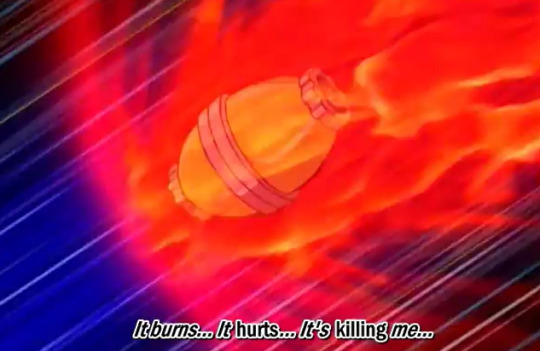
Yubel connected to his dreams called out for Judai every night, only for Judai’s parents to give him surgery that repressed his memories of Yubel causing him to forget them entirely. Yubel then spent the next ten years alone in space, continuously subjected to painful torture, with their cries for help being ignored.
"I was suffering even as you came to forget about me..."
Yubel is then met with the question of how can Judai treat them this way if they loved him so much? As from Yubel’s perspective, they’ve only ever tried to protect Judai, only for Judai to not only throw them away, but subject them to painful torture and ignore their cries for help. Judai effectively moves on with his life, goes to duel academy, makes friends while Yubel is left to suffer in silence all but forgotten.
This is where Judai’s ignorance has serious plot consequences.
It’s not just the pain that Yubel endured that made them snap. It’s that their pain went ignored.
Yubel holds out the faint hope that Judai will answer their calls fro help until they finally burn up upon re-entry into earth’s orbit. At which point they’re left as nothing more than a single hand crawling on the ground.
Yubel who cannot fathom why Judai would cause them so much pain, and then forget about them, convinces themselves that Judai must be causing them pain, BECAUSE he loves them.
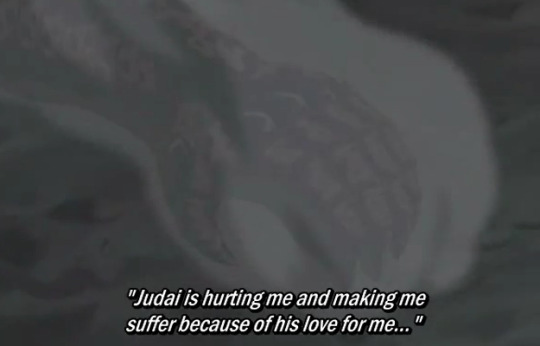
But you see, I couldn't possibly forget about you in the time that I've suffered...
Judai is allowed to move on with his life, to make friends, to spend the next ten years doing so while Yubel is subjected to ten years of agony. When they finally escape their painful torment, they see all the friends Judai has made while they’re left alone and forgotten.
However, Yubel’s goal isn’t revenge. Rather, it’s to make Judai share and recognize their pain. WHich is why I said it’s not the fact that they were made to suffer, but their suffering is ignored. Yubel’s entire philosophy revolves around the idea that sharing pain is an expression of love, and that they and Judai share their love for each other by hurting each other.
"That's why I sought to fill all those linked to you, your world, with both sadness and anguish..."
For Yubel, making all of Judai’s friends suffer and Judai themselves suffer is a way of making them and Judai equals again. They want to show “their love” for Judai, but it’s more about forcing Judai to recognize the pain he’s caused them by forcing him through the same pain.
Yubel’s philosophy of sharing pain is actually a twisted form of empathy.
They’re not entirely wrong either, that even people who love each other can cause each other pain, and that if one person is suffering alone in a relationship or the suffering is one-sided then there’s something wrong with that relationship.
Yubel: I get it now… You weren’t in love, with Echo.
Yubel: No.. you may have loved her just enough to clear the conditions in palace for you to control Exodia, but the you didn’t truly love each other.
Yubel: You were only unfairly hurting her, while you stayed unharmed. You wouldn’t suffer. You wouldn’t suffer. You wouldn’t be in pain.
Amon: What are you getting at?
Yubel: I’ve been hurt! I’ve suffered! I’ve been in pain. That’s why I’m making JUdai feel the same things I did!
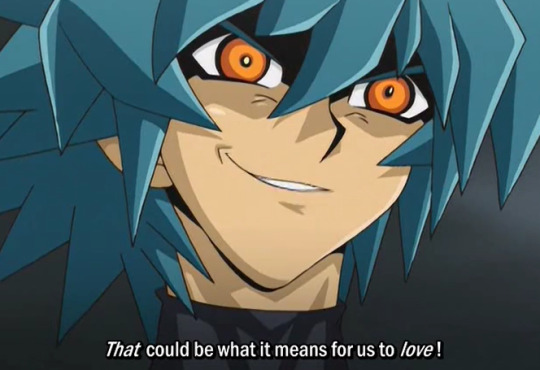
Yubel’s twisted theory of love, is a pretty thinly veiled cry for empathy.
They break out into tears when talking to Amon about the way they’ve hurt and suffered. They clearly state upfront that their goal is for Judai to recognize their love. One of the first things they say to Judai is a plea for Judai to remember them.
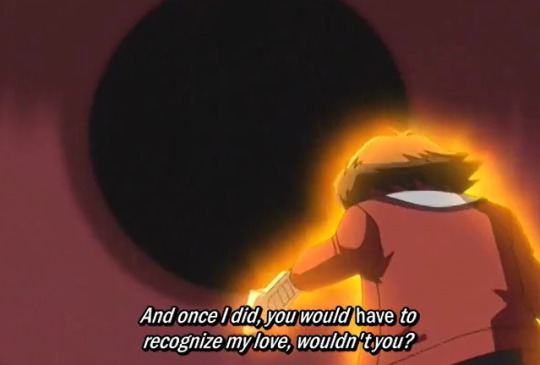
Yubel is presented as a very human character suffering through a lot of pain throughout their entire villai arc, they break down into tears multiple times, they cry out in agony, they're visibly suffering and you see their mental walls begin to break down when Judai denies them any empathy.
Yubel is actually incredibly clear and straightforward about their desire to be saved by Judai. However, Judai doesn’t lift a single finger to help Yubel the entire arc, even though they themselves admit they are directly responsible for Yubel’s suffering but they helped create who they are today.
Judai plunges into a different dimension and gives up everything to save someone, but it’s Johan, not Yubel they try to save. You have Johan, the perfect friend, and perfect victim that Judai gets obsessed over and will not stop at anything to save, and then you have Yubel, the imperfect victim that is actively harming Judai and all of his friends that Judai chooses to ignore.
The whole season Judai only focuses on saving the perfect victim Johan, and this is clearly shown to be a flaw. Judai doesn’t just ignore Yubel to save Johan, he also ignores every single one of his friends.
Judai only caring about saving Johan, and deliberately ignoring and abandoning the friends who came with him to help, essentially abandoning them the way he did Yubel leads to another consequence. After he abandons them they get captured, rounded up, and actually die and become human sacrifices.
Losing his friends, causes Judai to snap. Judai becomes the supreme king and decides power is all that matters; he starts killing duel spirits en masse in order to forge the super polymerization card. Which means being left alone, suffering alone, being abandoned by everyone causes Judai to snap the exact same way that Yubel did.
In fact Judai is only saved from his darkest moment, because two of his friends sacrifice their lives, trying to get through to him and appeal to his humanity. At that point Judai’s friends could have just chosen to put him down like a mad dog, to punish him for the amount of people he’s killed, but instead they try to save him because of their friendship.
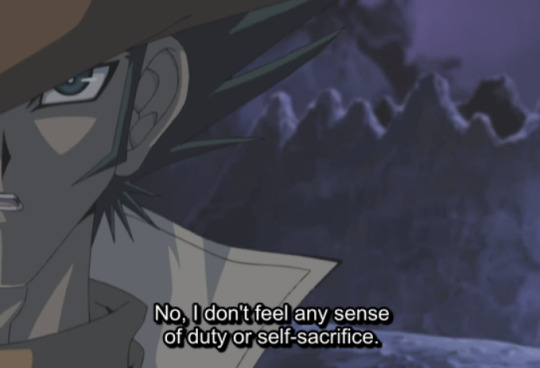
I just want to save my friend. That is all.
By the time Judai is facing Yubel in their final fight, Judai doesn’t have the moral highground against Yubel in any way whatsoever. They’ve both lashed out because of the pain they endured and killed countless people in the process of lashing out.
The only real difference between them is that Judai is lucky. He had friends to support him at his lowest point, while Yubel didn’t. Does Judai learn from Jim’s example, and go out of their way to save Yubel the same way they were saved because Yubel is still a friend?
Nope, Judai tries to kill Yubel at this point.
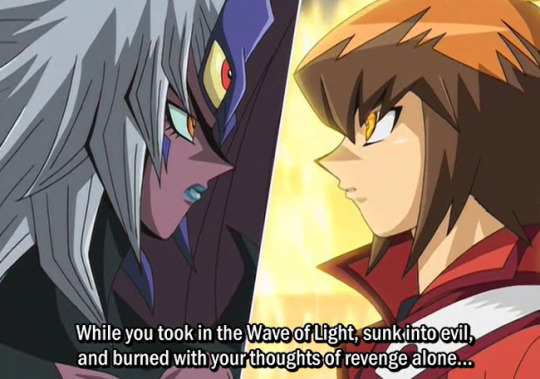
I made a lot of friends...
And they all taught me something… real love is wide enough, large enough and deep enough to fill the universe. Your so-called love is only a conceited delusion.
Like, Judai, sweetie baby honey darling. How was Yubel supposed to make friends when they were floating in the empty void of space?
Judai hasn’t learned, they are still ignorant, and still turn a blind eye to Yubel’s suffering. After all if his love is wide enough, large enough,and deep enough to fill the universe then why don’t thy have any room in their heart whatsoever for empathizing with Yubel?
Judai making friends while Yubel was trapped in space doesn’t make Judai a better person than Yubel, it makes Judai lucky. Judai doesn’t even appreciate that luck, because he treats his friends like garbage.
It’s not about whether Yubel is worthy of salvation, because Judai is a mass murderer and his friends still went to great lengths to save them anyway. It’s that Judai doesn’t want to empathize with Yubel, because they still want to remain ignorant and irresponsible.
Judai wants to continue playing hero, with a very black and white definition of what a hero is. By this point Judai’s killed lots of people, but if he makes Yubel the villain in the situation, he can keep playing hero. He doesn’t have to look at himself and what he’s done, because blaming everything that happened on Yubel and then putting Yubel down like a mad dog allows Judai to absolve his own guilt. Judai practically ignores Yubel’s cries for help, even when Yubel spells it out for them.

I couldn't have lived with the heartache unless I felt that I was being loved...
At this point Yubel themselves acknowledges that their love was just a delusion. That it was a coping mechanism, because they couldn’t live with all the pain otherwise. WIthout it they would have just died, which makes Judai unmoved.
The implication here is that Judai thinks yes, Yubel should have just died in that crater. It would have been easier for Yubel to die a perfect victim, then for Yubel to crawl out of that crater and go on to hurt other people.
While that may be true the same can be said for Judai - it would have been better if Judai died rather than become the Supreme King. His friends could have put him down like a mad dog, you could have even called that justice - but they didn’t.
Judai making no attempt to save Yubel isn’t because he thinks it’s morally wrong to save someone who’s killed as many people as Yubel has, or because he thinks he can’t forgive Yubel, it’s because Judai is taking the easy way out. Johan is a nice, easy victim to save, because he’s Judai’s perfect boyfriend, while Yubel is a complex victim that requires Judai to understand their suffering.
Even the act of saving Johan isn’t about Johan himself, it’s about the fact that Judai feels guilt over Johan’s disappearance. What Judai wants isn’t really to save a friend, but to stop feeling guilty over that friend. Judai isn’t just disgusted by Yubel’s actions towards his friend, he also wants to avoid the guilt he feels over causing all of Yubel’s suffering, because it requires acknowledging the complex reality that he is both victim and perpretrator in this case, just as Yubel is both victim and perpetrator.
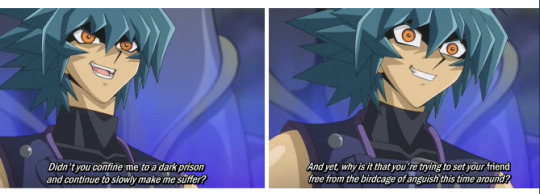
So how can an arc where Judai doesn’t try to save Yubel until the last possible minute, be better than an arc where Deku makes it his goal for the final act of the manga to save the crying boy in Shigaraki?
It’s because the story does not let Judai get away with his continual refusal to empathize with Yubel. Yubel’s entire character revolves around empathy, in the form of sharing pain.
As a duel monster, Yubel’s effect is that they are a 0/0 attack monster who is immune to all damage, but when you attack them they deal all the damage back to you. Which means that Yubel will respond to all the pain they feel, by causing you just as much pain in return.
Yubel is not a character who can be defeated in a fight, or a duel. In fact they’re the only Yu-Gi-Oh villain who never loses a duel once. The most Judai can do is duel them to a draw, and they draw three times. Yubel wins against everyone else who challenges them.
In a way Yubel is like Shigaraki, the ultimate, unkillable enemy that can’t be done away with violence. Judai’s refusal to empathize with Yubel or attempt communication also makes them worse, every time Yubel is hurt they escalate. THe more Judai hurts them, the more they will hurt in return, it’s a cycle that will never be broken simply by killing Yubel, because Yubel is unkillable.
Not only that but the story has gone to great lengths to show that saving Yubel is the correct course of action. If Judai doesn’t save Yubel, he’s basically spitting on the selflessness Jim showed in saving him. In fact if he doesn’t save Yubel, Judai is contradicting his own words on what makes a good friend.
Sho once asks Judai after witnessing his brother change, what he should do if a person you lov ehas changed into an entirely different person. What if they're a person you don't even recognize any more? A person you don’t even necessarily like anymore?
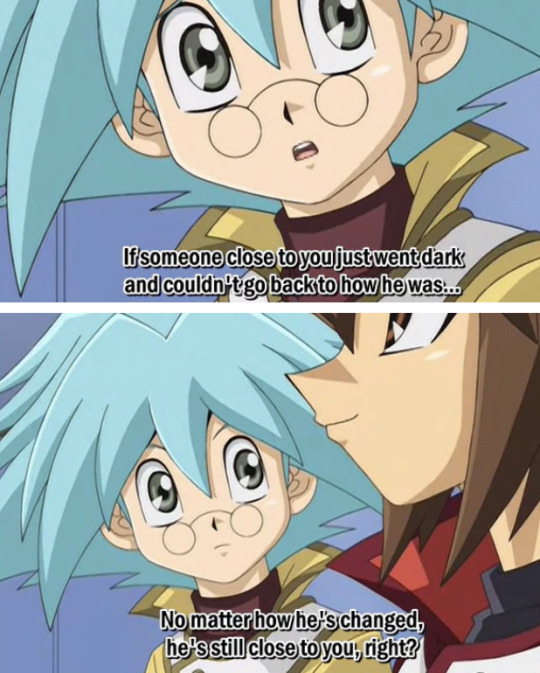
That's why if it were me. I'd probably just be looking after him until the very end, even if I didn't like him. I'd do it cause I think it'd prove that I care about him.
Judai doesn't even say that Sho is obligated to save his brother or morally redeem him, just that he has to keep looking at him instead of turning away or ignoring him.
Judai is being a bad friend, by his own definition. By choosing to deliberately look away from Yubel, Judai’s not living up to his advice for Sho for how you treat people you care about.
Which is why the resolution for Judai and Yubel’s arc is so important, because it’s done by Judai finally acknowledging Yubel’s pain, and promising to watch over them from now on, words that are followed by the action of physically fusing their souls together so they’ll never be alone again.
Judai doesn’t just say pretty words about how they won’t ignore the crying child inside of Yubel, but instead he makes a sacrifice to save Yubel at risk to themselves to show their words are backed up by actions. Judai says Yubel will never be alone again, and then he commits.
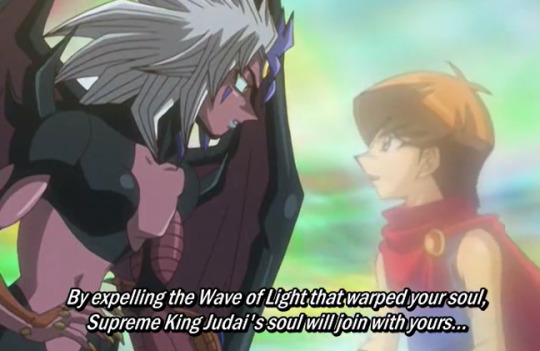
"And even if that means I won't exist anymore... I don't care."
Judai has resolved his character arc by this action, because Judai is finally taking on responsibility and that responsibility is watching over Yubel, so the two of them can atone together. Judai even says himself this isn’t an act of sacrifice on his part, but rather him finally accepting adult responsibilities.
Judai: I wouldn't sacrifice myself for you guys. I'm just going on a journey to grow from a kid into a man.
Judai needed to save Yubel to complete his character arc and grow as a person. If Judai hadn’t saved Yubel, he would have still remained an ignorant child. By learning not to turn a blind eye to Yubel’s pain, and also smacking sacrifices and physically doing something to atone for the way they ignored Yubel up until this point they’ve not only saved Yubel they’ve also done something to address their wrongs.
This also continues into the fourth season where Judai’s personal growth results in him learning what kind of hero he wants to be as in Season 4 in order to atone for the spirits that Judai slaughtered, he decides to leave his friends behind and walk the earth with Yubel helping spirits and humans get along with each other.
In fact Judai’s final speech as a character isn’t even about how strong he is as a hero, but how weak he is as a person.
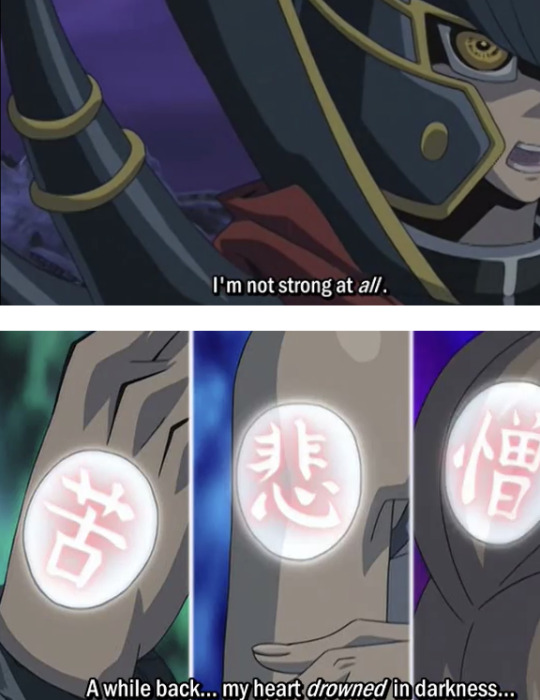
And I put my friends through some rough times. Form that, I figured a few things out... all I can do is believe in them.
The lesson Judai learned is because he’s weak, he needs to empathize and believe in other people the same way that his friends once believed in him when he was at his lowest point. Judai’s not the strongest hero, he’s the weakest one, but that gives him the ability to empathize with people who were lost just like he was, and guide them back from the darkness.
The story of how Deku became the worst hero.
I’m going to say this right now it might turn out next week that Shigaraki is just fine, and he’ll use the overhaul quirk to reconstruct his body. However, even if that happens Deku has completely failed at his goal of saving Shigaraki for the reasons I’ll illustrate below.
In theory, Deku’s arc of saving Shigaraki, and therefore winning by saving should be much easier for the story to accomplish and also much less frustrating to watch. After all, Shigaraki has been around since the beginning of the manga, he’s literally the first villain that Deku faces. He’s also the first villain that Deku talks to, where he brings up the idea that there were some people All Might failed to save.
There’s also many intentional parallels between the two characters, the entire manga is about their parallel journeys of becoming the next generation hero and the next generation villain. Shigaraki even directly quotes the line at one point that all he wanted was for someone in his house to tell him he could still be a hero, the same line Deku said in the first chapter was that he wanted his mom to tell him to be a hero instead of apoalogizing to him for being quirkless.
Not only is the setup for Shigaraki and Deku made obvious (Deku can redeem Shigaraki by telling him that he can still be a hero too), but Deku himself states out loud that he wants to save the crying child inside of Shigaraki.
Judai runs away from Yubel the whole time, whereas Deku is running towards Shigaraki and actively makes it his goal to understand Shigaraki and continue to see him as a human being rather than a villain.
The story also makes it clear that saving Shigaraki is necessary to saving hero society as a whole. After all Yubel is just Judai’s victim. Whereas Shigaraki is the victim of all of society. He’s the crying child who was ignored. The cycle won’t be broken if heroes continue choosing to ignore people like Shigaraki, because more victims will grow up to replace him.
Shigaraki: Everything I've witnessed, this whole system you've built has always rejected me. Now I'm ready to reject it. That's why I destroy. That's why I took this power formyself? Simple enough, yeah? I don't care if you don't understand. That's what makes us heroes and villains.
Shigaraki rejects the world because the world continues to reject him. THe solution to this problem is not rejecting Shigaraki, because Shigaraki won’t go away, the system will just continue to reject people like Shigaraki. As long as heroes and villains don’t understand each other, they’ll keep being forced to fight and the conflict won’t end, because hero society is what engineers it’s own villains.
clear as day by the story itself. If the objective of saving Shigaraki is clear, then how exactly did the story fail in this objective? What went wrong?
In this case it’s a failure of framing, and breaking the rules of “show don’t tell.”
Stories are all about actions and consequences. When a character makes a certain action in a story, the way other characters around them, the world, and whatever consequences that action frames that action in a certain light. It provides context for how we are supposed to interpret that character in that moment.
For example, when a character does something wrong and another character directly confronts them over what they did wrong, that frames them as in the wrong. The story is criticizing the character for what they did wrong.
Context is everything in a story. Stories are just ideas, so they require framing and context to communicate those ideas for the audience. Certain character attributes can be strengths or flaws depending on the context.
My go to example is that if you put Othello in Hamlet, the conflict would be resolved in five seconds because Othello’s straightforward personality and determination would have him kill Hamlet’s uncle without questioning things. Whereas, Hamlet constantly questioning and second guessing himself would lead to the worst ending possible. However, if you put Hamlet in Othello, then Hamlet wouldn’t fall prey to Iago’s manipulations, because Othello doubts and questions everything so he wouldn’t believe Iago the way Othello did.
Hamlet’s contemplative and introverted nature can be a strength in one situation, and a flaw in another. Othello’s tendency to act without thinking things through can be a strength in one situation, and a flaw in another. Context matters, because context tells you how you’re supposed to interpret a certain characters actions, and therefore tells you more about that character.
This is why people repeat “Show don’t tell” as the golden rule of storytelling, it’s one thing to say something about a character, it’s another to us the characters actions in the story itself to show them something about the character.
What’s even worse then breaking the rules of show don’t tell however, is telling the audience one thing, and then going onto show in the narrative something completely different. In that case the narrative becomes muddled and confusing to read. If I the narrator say “Hamlet is someone who overthinks everything” and then in the story Hamlet walks up to his uncle and kills him with no hesitation, then the narrator is straight up unreliable. It becomes impossible to tell as an author what message I’m trying to get across about these characters, because I’m telling you one thing and showing another.
This is why the writing fails in the second half of My Hero Academia because we are constantly told one thing, but then the story shows something entirely different and sometimes even contradictory to the thing we are being told.
Judai is a much worse hero than Deku, he always runs away from Yubel, and we’re never directly told that he’s supposed to save Yubel either. However, the narrative is incredibly consistent. Judai’s behavior of running away is consistent with his character. All the other character call Judai selfish for abandoning his friends (and they’re not even talking about Yubel). Judai is never painted in any positive light for his actions, therefore we as the audience understand Judai’s behavior is wrong and he needs to fix it.
The narrative makes it clear that Judai needs to grow up, and Judai is never rewarded for his refusal to grow up, he’s ruthlessly chewed out, not by his enemies but also by his own friends.
However, the narrative isn’t merciless on him either. Season 3 of GX is dark, but it’s not grimdark. Even when Judai loses his way, he’s still shown love and compassion by those same friends who go to great lengths for his sake. The narrative criticize Judai but it never insists that he’s beyond redemption and needs to be put down like a mad dog.
The message is very clear, that not only does Judai need to grow up, but he also deserves the chance to grow and change, which is why he should give Yubel a similar chance.
In comparison the story sets out this clear narrative arc for Deku of understanding Shigaraki, but it never challenges him for failing to understand Shigaraki. If you listen to what the narrative says, how other characters describe Deku, and what Deku himself says and only read it on a surface level then yes, Deku’s goal is to save Shigaraki.
If you analyze actions however, he is in effect just like Judai he never takes any meaningful action or steps towards Shigaraki, nor does he think of what saving Shigaraki might look like or entail.
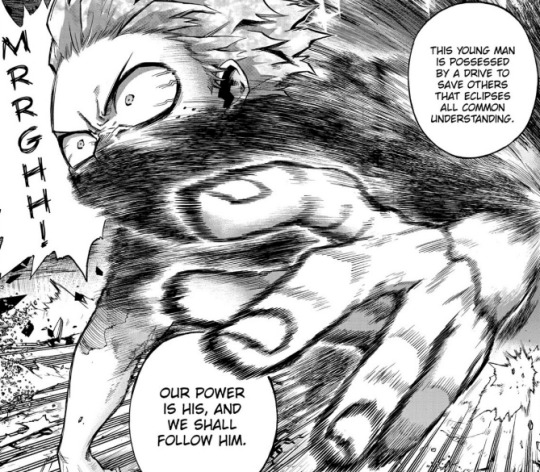
The story describes Deku as someone who is possessed by a drive to save others that eclipses all common understanding, but does the story give us any examples of that behavior?
Judai is characterized as a selfish, irresponsible child, and the story gives us countless examples of his immaturity and how it hurts others. Does the story of MHA do the same for Deku's purported virtues?
Let’s run through Deku’s actions, step by step, the actions themselves and how they are framed in order to find any evidence that Deku possesses this drive to save others. Does Deku reflect at all on the question of:
Can Shigaraki be Saved?
Deku leaves on a journey to try to understand villains. When he makes a perfunctory attempt to understand and empathize with Muscle, and Muscle replies that some people are just evil does Deku keep trying to reach his heart?
Nope, he just punches him.
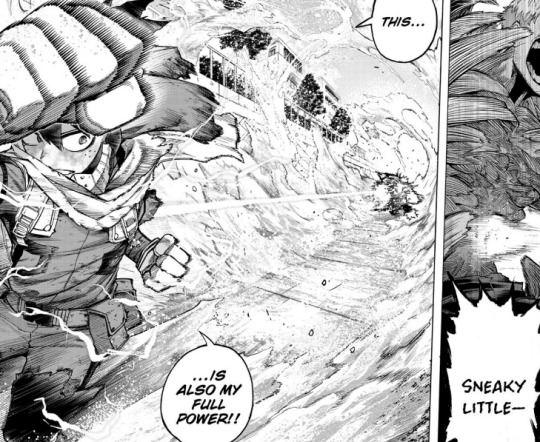
Well, if he’s failed in his goal of understanding a villain then does the story call him out on his failure? Does Deku face any sort of narrative consequence for that failure? Is he framed negatively for failing to understand Muscle, the same way that Judai is framed for abandoning Yubel?
Nope. Deku doesn’t express any frustration at all over is inability to reason with Muscle. There’s also no negative consequence for Deku just choosing to punch muscle, it turns out that there was no reasoning with Muscle and some people are just bad eggs so Deku was right.
It’s okay for characters to fail, but if a character fails and it’s not framed by the story as a failure then the writing itself as failed. Why even bother to include this scene in the first place if it doesn’t advance Deku’s character in any way? This scene in spite of showing Deku failing to understand someone actively paints Deku in a positive light, because of how much stronger he is ow that he can OHKO a guy that gave him trouble all the way back in the camp arc.
This scene doesn’t tell anything about Deku as a character, it just makes him look cool. In fact that’s precisely the problem, Deku isn’t adequately challenged as a character, because he’s never allowed to fail. Even when he does obviously fail at the things the narrative set out for him to do, he’s never challenged on those failures, because the priority isn’t to make Deku grow, it’s to make Deku look good.
As I said before, Judai is the hero because he’s the weakest. Deku is the hero because he’s the strongest.
Well, next a big flaw on Deku’s part is that he worshippd the same heroes that were making the world corrupt. Heroes like Endeavor who created people like Dabi. So, does Deku take action to either criticize the older generation of heroes, or separate himself from them in order to try to be better than them?
Nope, he teams up with them. Not only that, Deku can’t do something as simple as tell Gran Torino out loud about his plans to save Shigaraki. If Deku feels that Shigaraki is worthy of salvation then he should at least try to make an argument here about his ideal of saving others.
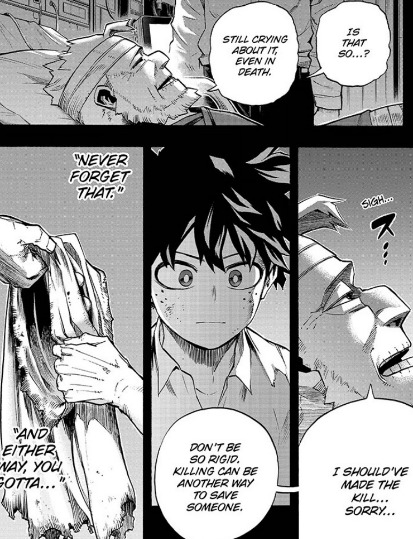
Now here’s the thing, if Deku hadn’t directly looked at the camera and told us he wanted to save Shgiaraki, would we be able to deduce his intentions from his actions? If you took away all of Deku’s internal monologue, and just showed him punching Muscular and saying nothing when Gran Torino says he may have no choice but to kill Shigaraki would anything about Deku’s actions indicate that he wants to save Shigaraki?
Let me use avatar the last airbender as a positive example for a moment. People say that Aang’s desire to spare Ozai’s life comes out of left field, but like if you analyze Aang as a character down to their bending, and the way they react in situations they always prefer de-escalation, or taking a third option as opposed to confronting things head on. It’s literally why Toph says Aang has trouble learning earth bending, because as an airbender, he always tries to look for some other way to solve the problem, instead of a direct confrontation with force. As early as season one, Aang tells Zuko someone who has tried to kill him several times that he was friends with someone from the fire nation one hundred years ago and in a different situation they could be friends.
Aang’s desire to save the Firelord may not have been told to us until the last possible minute, but Aang’s aversion to violence has always been a part of his character from the beginning. However, Deku never shows any similar aversion to violence. There’s basically no example where he ever tries to de-escalate a situation, or he avoids a conflict by seeking a third option.
Anyway, let’s move onto the next example. In the confrontation where Lady Nagant fights Deku, when Deku learns the fact that the heroes were employing government hitmen to attack people for uhh… exercising free speech does Deku give any reaction to this information?
When Lady Nagant says that Deku is only going to bring back the status quo, does he show her any meaningful evidence that he won’t do that.
Deku’s response is because the world is so grey, he needs to extend a helping hand to others. Which you know what thay could be a response. Deku saying that his response to the corruption of the hero world is that he now understands that society led some people down the wrong path, so his way of addressing the wrongs of that society is lending a helping hand to as many people as possible even people he used to think was irredeemable.
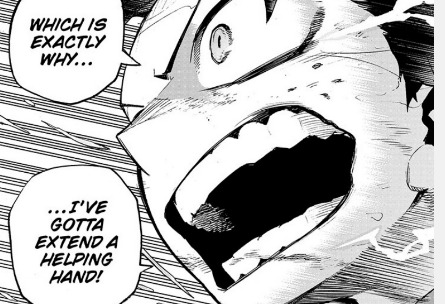
I will give Deku the benefit of the doubt, I think this is an acceptable answer. I can’t save everyone, but that’s not going to stop me from trying to save as many people as possible and maybe I can save people who were this society’s victims on the way too.
However, does Deku demonstrate his resolve to extend a helping hand in any meaningful way.
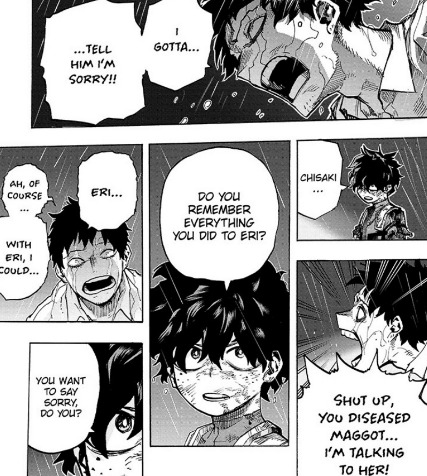
Deku is met with an armless, insane Overhaul who’s begging for someone to help heal his father figure in the Yakuza from his coma. This isn’t like Muscular who insists that there’s no helping him, Deku is met face by face with someone asking him for help. Deku’s gotta extend a helping arm whenever he can, because he knows some people were abandoned and led astray by this society…
Unless that person is someone he doesn’t like personally. At which point he only helps them on a conditional basis. We are told Deku will save anyone and everyone, but Deku is met face to face with an armless man who is begging for help and Deku’s does nothing to help him.
Deku’s not criticized for refusing to help overhaul either, it’s never brought up again.
When Deku begins to experience a mental breakdown because of all the people he’s trying to help in the Dark Deku arc, we are told this is the result of Deku trying to save everyone, but we do not see Deku attempting to save a single villain after Muscular and Nagant.
He exhausts himself beating up villains that AFO sends after him, and only helping innocent civilians. Which would be fine if this arc were about how Deku is running away from his real responsibilities the same way that Judai was running, but that’s not what we’re being told. We are told that this is all part of an arc of Deku learning to understand villains and be a hero.
Deku is asked “Can you save Shigaraki?” by the story, but Deku never at any point has to deliberate on that question. Judai doesn’t deliberate on that question either, but him choosing not to think about things and stay ignorant is the point.
It’s actually fine to make Deku stagnate as a character. It’s fine to have him take the easy way out by just punching villains and giving up on them after one conversation. It’s fine for him to be empathetic to other people’s suffering, or even self-righteous. It’s fine for him to be ignorant.
He could be all of those things if it was a part of a narrative teaching him to unlearn his behavior. In fact the narrative might have been better if Deku started out by saying he didn’t want to save Shigaraki, that there was no choice but to kill him, because then at least his actions would be consistent with his words. Then his lack of empathy and his tendency to resort to violently beating up villains instead of avoiding violence would be character flaws he could work on.
Deku however, is presented to us as this empathic hero who is always willing to give others a second chance though he never actually sticks his neck out in order to do so. Continuing on with our slow crawl through MHA, one of Deku’s friends is revealed as the traitor. Deku has a heartwarming scene fo saying that Aoyama can still be a hero, but look at his actions.
He lets the adults in the room physically tie Aoyama in a straightjacket and imprison him, for the crime of… doing bad things while he was in a hostage situation. Apparently, if a bank teller helps the bank robber by giving them money when the robber has a gun to his head, the swat team should just snipe the bank teller.
Not only does he not defend Aoyama against the adults, or stand up for him, or tell the adults they’re wrong to treat Aoyama a clear cut victim who had a gun to his head and was bing held hostage like he’s a villain - he also lets the adults use Aoyama an innocent victim as bait in order to lure out AFO. Deku tells Aoyama he can still be a hero, but he doesn’t defend Aoyama as a victim of being taken hostage, nor does he stop the adults from further taking advantage of him and throwing him right into danger. Some people are just led the wrong way that’s why they need to be extended a helping hand, but fuck Aoyama I guess. He needs to earn the right to be sympathized with by physically putting his life in danger.
Deku can’t even go out of his way to save a friend who he’s known for the better part of a year, when that friend is a complex victim forced to do bad things.
Then Deku and Uraraka have a conversation where they both, kind of ruminate on the idea that maybe the villains are human beings who are worthy of sympathy.
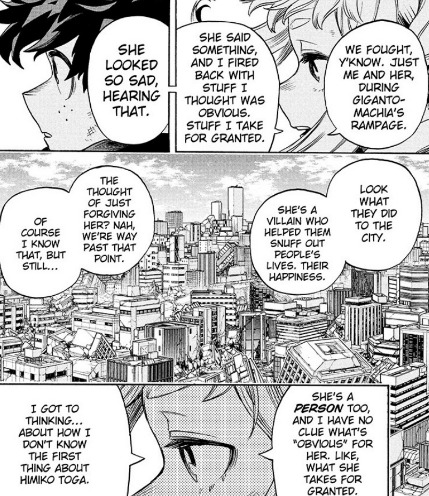
In fact Uraraka is actively trying to dehumanize Toga by looking at the destroyed city, so she won't have to think of Togaas a person.
The language here is also a major fault of this arc. It focuses far too hard on “forgiveness” over and over again. As I said before, saving Shigaraki isn’t about Shigaraki at all, it’s about Deku, and how he wants to use his power as a hero. Deku has even stated himself that he doesn’t believe that OFA is a power that should be used for killing people. So why does whether Toga or Shigaraki are forgivable or not even matter?
It’s the same with Deku refusing Overhaul any sympathy. If he’s so morally opposed to abusers, then why does he work with Endeavor and defend him at every visible opportunity, even in front of his victims?
Whether or not Deku can forgive Shigaraki doesn’t matter, because Deku is not the moral arbitrator or right and wrong. In fact Deku doesn’t even have any morals, so how is this a moral debate? Is there any point where Deku gives a clear definition of what he thinks right and wrong is? Does he quot Immanuel Kant to the audience?
Batman doesn’t kill people, not because he thinks that every last person on earth can be saved, but because Bruce Wayne an incredibly rich white man thinks that maybe he shouldn’t have the authority to decide who lives and who dies. When Bruce doesn’t kill the joker, it doesn’t mean he thinks the Jokers actions are forgivable, it’s because Bruce thinks it’s not his place to determine whether someone has the right to live.
The whole conflict that MHA presents us is that heroes pick and choose who to save, and only save the ones they deem as innocent. So, how does Deku saying repeatedly they can’t forgive Shigaraki contribute to that theme in any way?
In fact by focusing on forgiveness, rather than whether or not he personally has the right to pick and choose who lives and who dies Deku is ignoring the elephant in the room. The question isn’t about whether Shigaraki’s redeemable or if his deeds should ever be forgiven. The question is whether Deku has the right to decide who gets saved and who doesn’t.
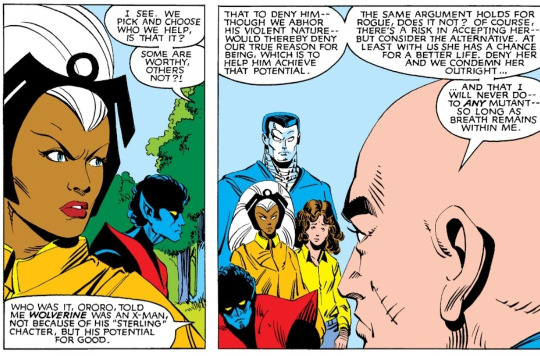
We are told that Deku as a character is someone who wants to save everyone no matter what, so Deku shouldn’t be focusing on whether or not Shigaraki is worthy of forgiveness, he should be making an idealistic argument like Xavier does in this panel. Why doesn’t Deku talk out loud with Uraraka on how he believes his power is for saving others, and not killing?
If he’s meant to represent some idealistic hero, then why doesn’t he even talk about his ideals? Why don’t I as the reader know what those ideals are?
I think Xavier’s ideals of forcing the X-men to provide a good example to the mutant community, in order to try to earn the respect of other human beings is wrong, but at least he has ideals.
He tries to inspire the other people around him to live up to those ideals. The story can criticize him for his ideals and point out how they’re wrong, while it can also uplift parts of his idelogy like where he believes there are no evil mutants. Deku has a chance to do the same to Uraraka, to tell her clearly, “I don’t think we as heroes have the right to pick and choose who we help…?” but he waffles. Not only does he waffle, but this moment is meant to be read as an indication that both Deku and Uraraka are sympathetic individuals who want to save their villains. They are supposed to look good and idealistic here and they don’t.
For Deku it just seems like a repeat of his behavior with Overhaul. The only villains that are worthy of sympathy, are the ones that he personally decides are forgivable.
The story isn’t about whether or not it’s moral to save someone who’s killed as many as Shigaraki has. The story never seriously discusses any sort of complex morality or moral philosophy. Once again to bring up avatar, yes you can argue Aang sparing the life of a war crimminal is bad, but Aang mentions on multiple occasions that he wants to retain the cultural values of the airbending people. Aang has a morality, a consistent morality, it might not be a morality you personally agree with but at least he has one.
Deku hates abusers, unless he’s next to Endeavor then he thinks abusers should be given the chance to atone. Deku doesn’t believe that One for All is a power for killing, but he never stands up to any of the adults who are blatantly trying to kill Shigaraki, he doesn’t even express out loud to Uraraka that he doesn’t think heroes have the right to decide who lives and who dies. In fact he’s given the perfect opportunity to, when Hawks kills a villain and it’s broadcast live on the news in font of everyone, but Deku never has anything to say about that.
The reason Deku and Uraraka both put such an emphasis on “forgiving” their villains has nothing to do with the story itself. It’s because the author Horikoshi, is afraid that some people will misinterpret his story as saying that he actually thinks that saving a villain like Shigaraki means that he condones mass murder, so he has to have the characters talk about not forgiving Shigaraki.
Judai doesn’t have any consistent morals either, but once again that’s the point and something the story relentlessly calls him out on.
Cobra: Fortune would never smile on a fool like you who fights while prattling on about enjoying duels.
Cobra: You are certainly a talented duelist. But you have one fatal flaw.
Judai: A fatal flaw?
Cobra: Yes, your duels are superficial. Someone who fights with nothing on his shoulders, cannot recover once he loses his enjoyment. What a duelist carries on his shoulders will become the power that supports him when he's up against the wall!
Cobra: But you have nothing like that! Those who go through life without anything like that cannot possibly seize victory.
Cobra: But I know that nothing I say will resonate with you... because you have nothing to lose but the match.
Judai: I...
Cobra: Afraid aren't you? Right now, you have nothing to support you.
Judai’s regularly called out for his superficiality. Judai is only a hero because he’s strong and wins fight, he doesn’t feel any responsibility towards other people, and in fact he loathes having to feel responsible for others. Judai isn’t just naive, he deliberately chooses to remain ignorant.
Since he’s ignorant of his own faults, he makes awful decisions when it comes time for him to lead, and his friends die because of choices he made.
We are told that Deku doesn’t want to remain ignorant, that he wants to understand villains, but Deku’s actual actions are him continuing to ignore society’s ills and the suffering of victims. In fact if you take away Deku’s internal monologue and the narration, Deku’s actions almost exactly mirror Judai’s.
Deku is just as superficial as Judai, and he also doesn't want to spend any time thinking about what kind of hero he wants to be, but the narrative never punishes him for it.
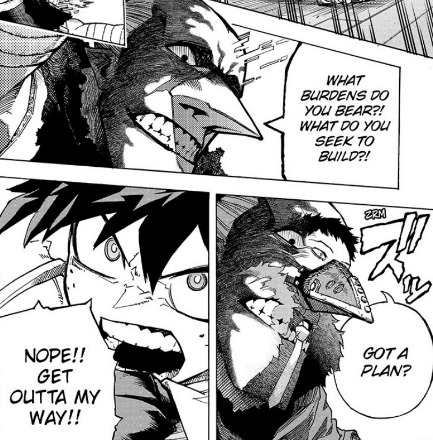
Judai is asked what burdens he has to bear and he has to meaningfull answer that question, Deku is allowed to get away with not having to think about anything. Deku remains superficial.
Both Judai and Deku spend the entire arc running away from their villain rather than confronting them in any meaningful way. They both never express out loud any sympathy for their villain, or try to empathize. THey both never step down from the role of hero, and only confront their villain as a hero, because they don’t want to think about themselves as complicit or in the wrong.
Shigaraki and Deku’s final confrontation mirrors Judai and Yubel’s but without the same clear framing. THe entire time Yubel is trying to get Judai to empathize with them, and Judai only responds with physical violence, because they don’t want to stop being the hero and because they can’t see Yubel as anything other than the villain.
As soon as Deku arrives on the battlefield (by the way everyone else and their mom pointed this out, but Deku who doesn’t think OFA is a power for killing, is completely okay with a plan called the “Sky coffin plan” where every other hero was clearly trying to murder Shigaraki).
When Deku arrives he asks if Shigaraki is still in there, but he doesn’t do anything to try to reach Shigaraki, he jumps right to punching him. In fact he never tries anything besides punching him as hard as possible.
How is punching Shigaraki with the force of a thousand suns saving him exactly?
How is that different from how he tried to defeat Shigaraki the last war arc, before he saw the image of the crying child that made him want to try a different approach in saving Shigaraki?
In Judai’s final fight with Yubel, it’s made explicitly clear that Judai is not trying to save Yubel, and that’s a fault on his part. In fact Judai gives the traditional “I have friends, and you don’t” speech to Yubel but it’s a subversion of how that speech is usually used.
Usually that speech is used to show that the protagonist won because of they valued friendship,while the villain treated their friends poorly and only cared about power. However, it’s ironic in this case because Judai got all of his friends killed. Judai treats his friends like garbage. This speech isn’t used to show that Judai is winning because he values his friends more than Yubel does, it shows that Judai is a hypocrite, playing the hero in this situation where they are just as bad as Yubel.
Judai’s not morally superior, he’s just lucky that he has good friends. Friends that were willing to save him. The only connection Yubel has to anyone else, Yubel’s only friend is Judai and Judai is a shit friend.
In fact, Mirio tries to give a version of the “You don’t have any friends” speech to Shigarkai, only for Shigaraki to get mad and tell Mirio that he does have friends and people he wants to protect.
This fact is also something that is blatantly ignored by Deku, even though Mirio tells him about it… even though we are told that Deku is trying his best to see the humanity in Shigaraki.
Judai blatantly admits they’re trying to kill Yubel. Which makes them a worse person, but a better character than Deku, because their actions are clearly framed by the narrative and consistent.
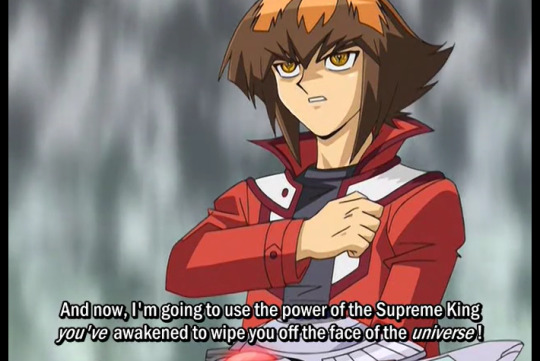
On the other hand we are told that Deku doesn’t want to kill Shigaraki, and yet everything Deku does makes it look like he’s just trying to kill Shigaraki and put him out of its misery. If we didn’t have Deku stating out loud that he wants to save Shigaraki and wants to see him as a human, there’d be nothing in his actions to indicate that he’s trying to avoid killing Shigaraki. Deku says he can’t pretend he didn’t see Shigaraki crying, but like, does he ever hesitate to punch Shigaraki, does he ever think that causing Shigaraki more harm is wrong when he’s already suffered so much?
Deku says that Shigaraki is a person but does he treat him like a person? Does he try to talk to him like a person?
To use avatar again, Aang does talk to Zuko pretty early on. Deku doesn’t even give the classic “We could have been friends under different circumstances” speech. When Shigaraki resists Deku’s attempts to see him as a person or emapthize with him, Deku’s response is to just resort to punching harder.
Which is in effect the same thing Judai does to Yubel, just kill them as a villain so they don’t hurt anybody else, but framed in an entirely different light. Judai is shown to be ruthless, and cold in his attempt to only settle the conflict with Yubel by violently putting them down. On the other hand we’re being told that Deku is compassionate and empathic while he punches Shigaraki with the force of a thousand suns.
There’s another eerie similarity between both of these final confrontations. At the climax of the confrontation, both Judai and Deku have a psychic vision where they see events from Yubel and Shigaraki’s childhood. This vision is supposed to help both characters understand the good in the villain they’re facing.
Let’s see the contents of this vision and how the visions change each character. Judai is shown a vision of his past life where Yubel sacrifices their entire body, and even their humanity to go through painful surgery to turn into an ugly dragon, all for the sake of protecting Judai in a previous life.
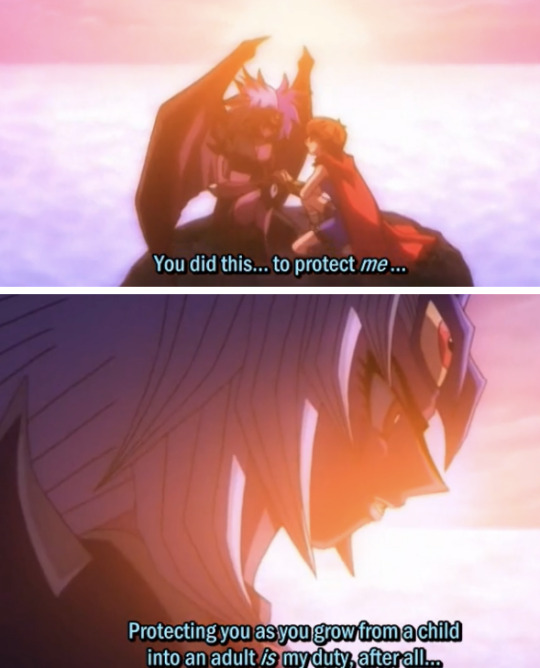
Judai is then forced to witness the good side of Yubel they’ve been ignoring all along to paint them as a villain. Yubel is simultaneously extremely selfish and willing to hurt people Judai cares about, but they’re also extremely selfless and will do anything to protect Judai and have made great sacrifices in the past for Judai’s sake.
Deku gives lip service to not ignoring the humanity in Shigaraki, but Judai is literally forced to acknowledge the humanity in Yubel. Not only that, but Judai changes his behavior immediately after learning this new information.
After seing the sacrifice that Yubel made for him in the past, Judai responds with a sacrifice of his own. A sacrifice that perfectly mirrors the sacrifice that Yubel once made for him. Yubel gave up their humanity for Judai, so Judai fuses his spirit to Yubel’s, becoming a human / spirit hybrid so Yubel no longer has to be alone.
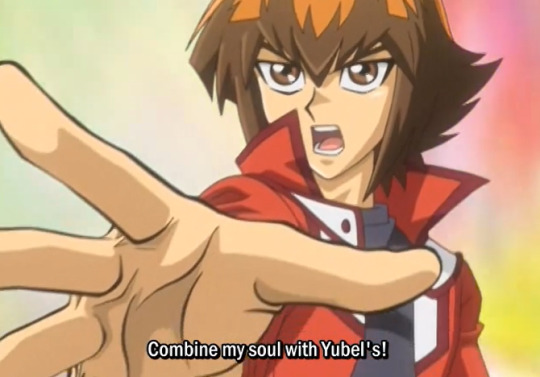
Judai also doesn’t just fuse their soul with Yubel’s in order to stop Yubel from destroying everything, it’s because both of them at this point need to atone together, and Judai is fulfilling his responsibility of watching over his friend until the end to prove that you care about them - as he said to Sho. Judai’s also fulfilling Johan’s dream of helping repair the bonds between spirits and humans, by reconciling with Yubel and repairing their bond. It’s also Judai atoning for his previous behavior of abandoning Yubel, by choosing to stay alongside them as they both atone together.
Deku does sacrifice OFA during the fight against Shigaraki, but their sacrifice isn’t to help Shigaraki, but rather doing psychic damage to Shigaraki by using OFA is the only way to defeat them. He transfers OFA in order to break Shigaraki’s brain so he’ll stop reissting and Deku can beat him down.
Judai fuses their soul together with Yubel out of empathy and a responsibility they feel to help their friend fater abandoning them, Deku transfers One for All to Shigaraki in order to hurt him and make him easier to punch. It's funny that Deku doesn't travel to Shigaraki's mind to learn more about him, but instead with the specific intent of harming him.
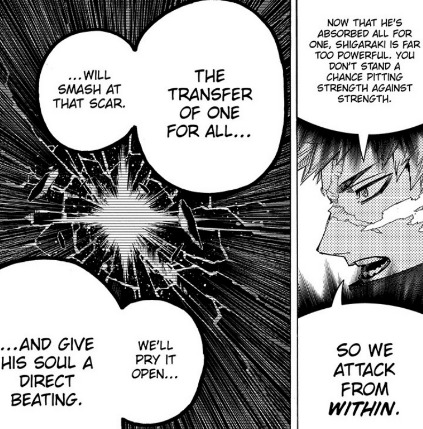
Once he's inside Shigaraki's mind, he doesn't take time to reflect on how Shigaraki used to stand up for bullied kids, or how he wants to be a hero to villains because no one else will stick up for the outcasts in society. No, he only care about Shigaraki when he takes the form of a child crying for help.
In the aftermath of the psychic vision Deku’s behavior doesn’t change towards Shigaraki in any way either. You could say he sacrificed his own arms in order to try to comfort Shigaraki within the depths of his own mind - but that’s not a real sacrifice either because his arms immediately come back.
When Judai learns about the sacrifice that Yubel made in a previous life towards him, he stops seeing Yubel as an enemy and finds a way to resolve things peacefully between them.
When Deku lanterns that Shigaraki’s a victim of All for One, and that his entire life was a lie, when he sees Shigaraki’s suffering first hand does his beavior twoards Shigaraki change in any way?
When he sees Afo has taken over Shigaraki’s body again, does he try to shout for Shigaraki, to tell Shigaraki to fight from the inside, to reassure Shigaraki that he’s still in there that there’s still good in him?
Nope. He just punches Shigaraki some more.
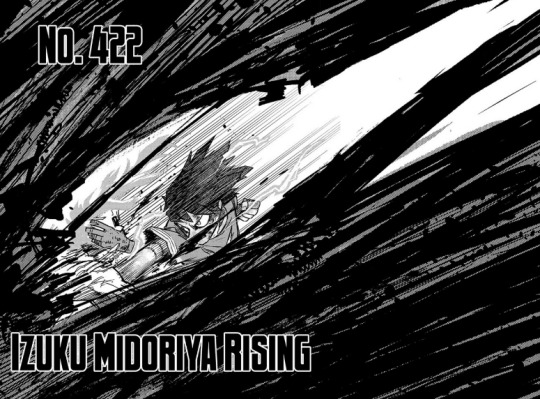
What Deku needed to tell Shigaraki is so obviously set up by the narrative too. Shigaraki wanted just one person in that house to tell him he could be a hero. Deku wanted his mother to tell him he could be a hero if he was quirkless.
Deku sees that Shigaraki started out as a boy who wanted to be a hero, and who was manipulated into being a villain but does he try to appeal to the boy inside of Shigaraki by telling him he can still be a hero? Does he now see the good in Shigaraki?
Nope, he just tries to kill him by punching him really hard.
I purposefully chose the images for the banner of this post, because it shows how differently MHA and GX treated its villains in the end. Yubel is embraced by Judai in the end, Shigaraki evaporates into dust.
"Judai, now that our souls have become one we will never be separated again. I have now been filled with your love and power. Let us fight together, against the wave of light leading this universe to destruction!"
Shigaraki could so easily have been given the love and empathy that Yubel was shown, but instead their life ends with no show of empathy from Deku, and with them dying believing that their long life of tragedy meant nothing in the end. Shigaraki realizes he's a crying kid, but he's never comforted.
Shigaraki: I only stole my body back from Master, and I didn't destroy anything. "In the end, I was just as you said... A crying kid, huh?"
Yubel is embraced and comforted, Shigaraki disintegrates into nothing.
One of these stories is apparently an optimistic story about heroes saving people, but it ends with the lifelong victim being killed in the most nihilistic manner possible, never receiving comfort, and never achieving anything with his long life.
The other story is a silly anime about card games, shows that when people are alone and suffering they can lash out and do terrible things. That all people are weak especially when they're alone, but the solution isn't to abandon them, or condemn them for their faults, but to believe in them and help uplift them the same way that Judai decides to uplift Yubel so they can atone together.
Which is why Deku gets an F in being a hero.
Go directly to summer school. Do not pass Go. Do not collect $100.
#mha meta#ygo meta#mha 423#bnha 423#mha 423 spoilers#bnha 423 spoilers#izuku midoriya#deku#shigaraki tomura#tenko shimura#judai yuki#yubel#soulshipping#yu gi oh gx#yu gi oh
684 notes
·
View notes
Text
can we also talk about toshinori crushing the "the end" card with his hand?
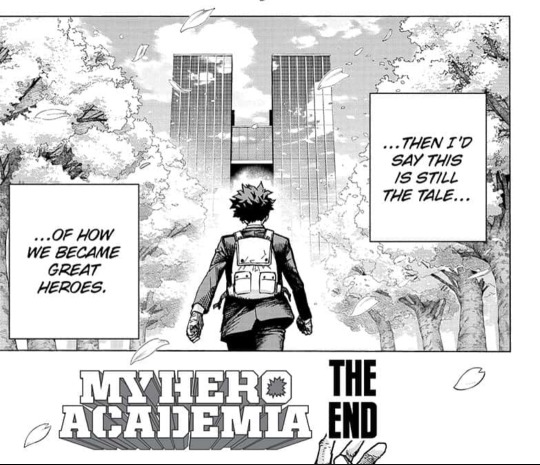

this man was gonna make sure his boy became a hero no matter what. like i'm fully aware this was probably just a humorous way to show us that this was not the end of deku's story, but to me it's symbolic of how the all might we meet at the start of the manga and this all might are not the same.
at the start of it all, he tells izuku he cannot be a hero without a quirk. but now he's the one quite literally breaking his way through deku's acceptance of his "fate" of not being a hero to tell him that he CAN be a hero. he's the one to hand him the tools to become a hero without a quirk (with bakugo, the one who always told him he'd never be a hero, being the one who spearheaded the efforts to get them made).
he crushed his dreams of being a quirkless hero once, and now he's crushing the idea that he CAN'T be a quirkless hero.
#dadmight#mha meta#my hero academia#mha spoilers#mha 430#bnha spoilers#bnha 430#boku no hero academia#all might#izuku midoriya
408 notes
·
View notes
Text
one of my favourite things to think about regarding izuku is whether or not he's oblivious to his feelings for katsuki. and when i say feelings, i mean just that--feelings. not necessarily romantic.


as i dive deeper into his character, i'm coming to this conclusion:
he is not oblivious to the fact that he has complicated and undefined feelings for katsuki. those feelings and his reactions to said feelings are shameful, "gross" according to izuku.
but his behavior, inspired by katsuki, is instinctual now.

he's talking to toga like he doesn't understand how someone could do awful things in the name of love, yet he shames himself for just insulting villains. on a lesser scale, izuku knows that feeling of wanting to be like someone else but being shamed for it--even if he himself is the one doing the shaming.
that's why he's significantly less empathetic towards himiko. he can understand shigaraki and touya. he tried to understand muscular, but resolved to just defeat him.
he doesn't give himiko that same empathy. because he relates to her and it hurts him.
881 notes
·
View notes
Text
MAJOR BNHA 423 SPOILERS
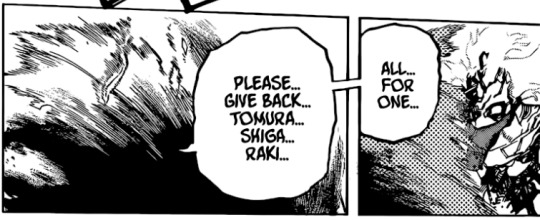

this line is so jarring to me because if shigaraki really is gone... where are his friends waiting?
up until now we always took their survival for granted, no matter the situation they ended up in. toga's blood loss. dabi's quirk awakening at the brink of death.
but calling back on shiggy's line "even if [...] i turned into an empty shell, i'd still need to become a hero to those guys"
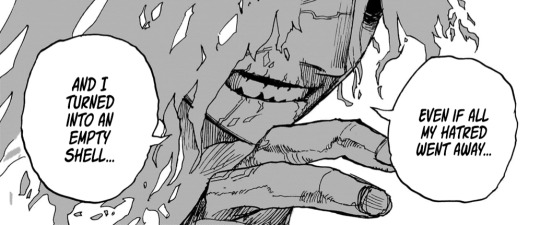
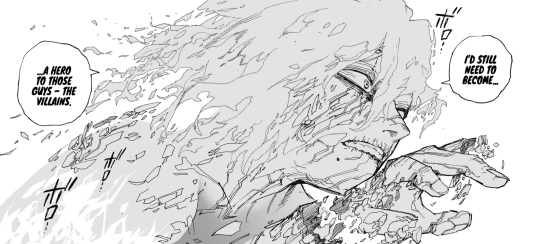
suddenly has me worried about the fate of toga and dabi.
they're waiting for him.
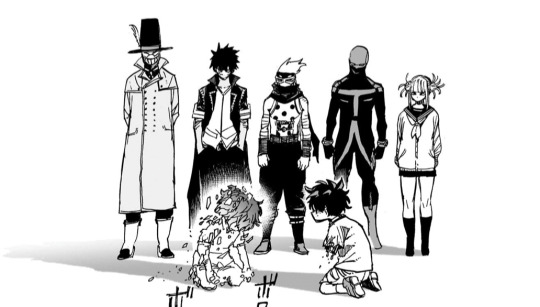

but where?
#bnha 423#tomura shigaraki#shigaraki tomura#dabi#todoroki touya#toga himiko#midoriya izuku#all for one#poetic cinema but at WHAT COST#bnha meta#izuki midoriya#touya todoroki#himiko toga#shimura tenko#tenko shimura#boku no hero academia#mha#x#bnha spoilers //#manga spoilers //#kohei horikoshi
836 notes
·
View notes
Text
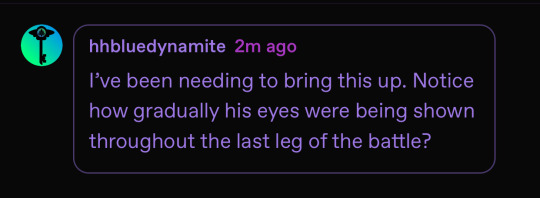
@hhbluedynamite I’m going to make separate post here to address this. Tumblr mobile is a pain and I can’t add all picture examples I want to it here goes.
This has been a debate ever since My Hero came out,
“Why are All Mights eyes black?”
There’s been multiple explanations from how his borrowed quirk works to simply his own emaciated state. I’ve come up with my own theory. It’s said the eyes are the windows to the soul. I believe All Might’s eyes grow darker the more “weight” he carries.
For example,
When All Might was a kid, his eyes were normal. White. After losing his family, rendering him an orphan, white. Even after losing Nana, still he looked normal.
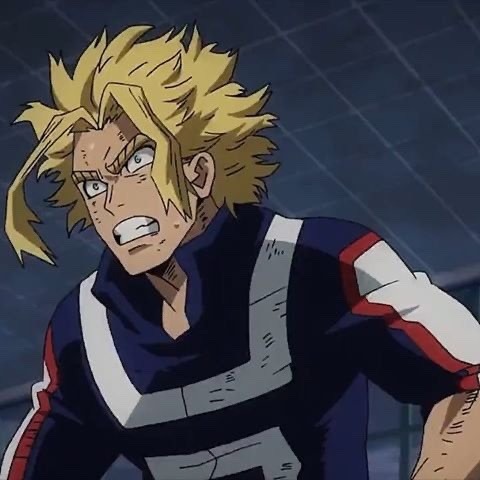
And after first releasing to the public.
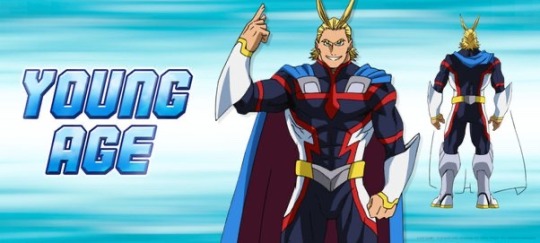
This is because although he’d already been thru hell and back emotionally, he’s still normal. Even with his quirk.
Then, after he’d been in the game a while, they suddenly darkened.
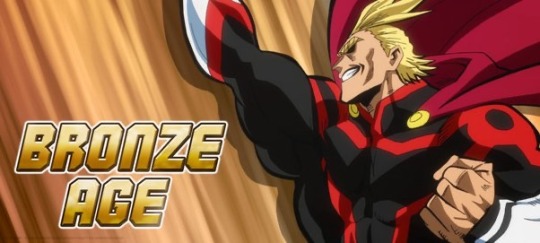
Why?
Because by that time, the full gravity of his position, his responsibility and the realization he was essentially alone in that place, had fully sunk in.
Because he was so over powered above everyone else, everyone including the heroes left him to take care of almost everything they felt was too hard. And because he’s a selfless person at heart without a care to his own safety, he willingly allowed it to happen without asking for help. He didn’t want to risk losing anyone else. Which is also why he didn’t take on any sidekicks.
Until Nighteye.
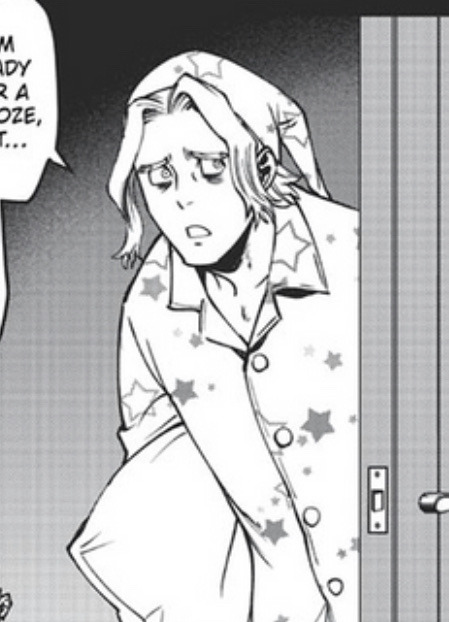
Vigilantes showed us Toshinori when he wasn’t being All Might. And his eyes turn back into white in his more relaxed form, albeit with tired lines beneath them. However this is when he had Nighteye to count on. And Nighteye can see the future, so perhaps he would be safe, right? Well we know what happened there.
After he and Nighteye break up go their separate ways, we never see Toshinori with white eyes again. (Unless I’m forgetting so please tell me if I am). Now he’s injured, only a handful of people to trust, and none can truly understand what he’s going through. At this time he truly is alone, and the one thing that gives him joy is slowly but surely being fizzled out within him.
All Might’s eyes continued to remain black for years. Even after giving his quirk to Izuku. He still felt the weight of the world on his shoulders because he feared for Izuku’s safety. Blamed himself for every scar and Injury the boy suffered thru. Even though he was retired, nothing had changed. In fact it was worse now, because he could do nothing to help anymore.
And then he gains support items to face AFO for the last time. He’s a distraction, a willing sacrifice to slow the monster down, and he couldn’t be happier. We see the whites of his for the first time. All through the fight we see them, shaded albeit, but they’re there.
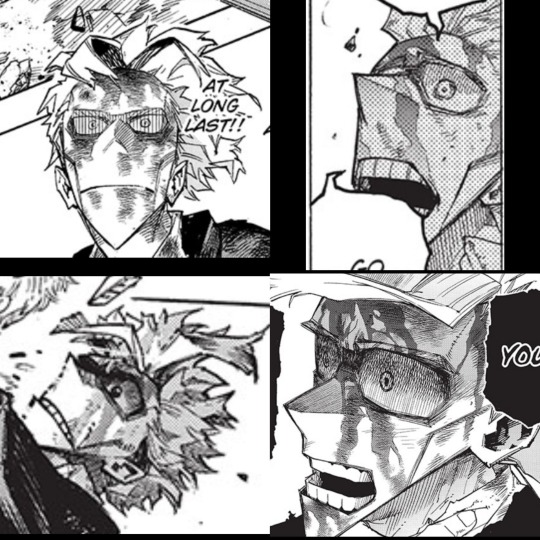
When he speaks to Nighteye asking if this isn’t the place he was meant to die, Nighteye confirms that it is. The fact that he’s still alive makes him raise the question, why is he still here then? I’m the mentor, Izuku is a ready and worthy apprentice. He doesn’t need me anymore. I’m supposed to be dead by now. His eyes seem darker here, as if the weight and his own depression have increased again. Perhaps begrudgingly accepting his fate.
But then here after Nighteye tells him he reads too many comic books, and that there’s no way he would go out that way, we get a closer look. Although his eyes are still shrouded in black because of his emaciated state. His eyes themselves are clearer, brighter. Even if Nighteye is only in his head, his words are still bringing him hope deep down.
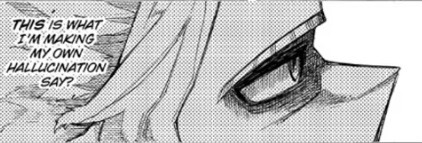
While being tended to medically, his eyes are dark again, though I believe this is mainly due to him barely being alive and conscious at this point. And they’re still white, more than we’re used to seeing.
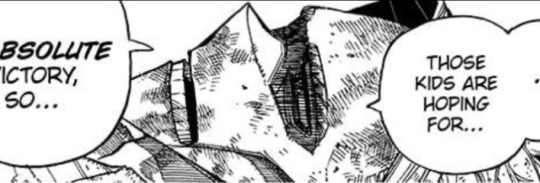
Finally after the war while they’re recovering, his eyes remain white, though they’re still shaded. The weight is still present. His work isn’t done yet. Izuku is losing his quirk, and he still feels like a failure in some sense because of that. Also because he and Bakugo almost died. And because of everyone who did die in the war all because he failed to stop AFO after three tries.
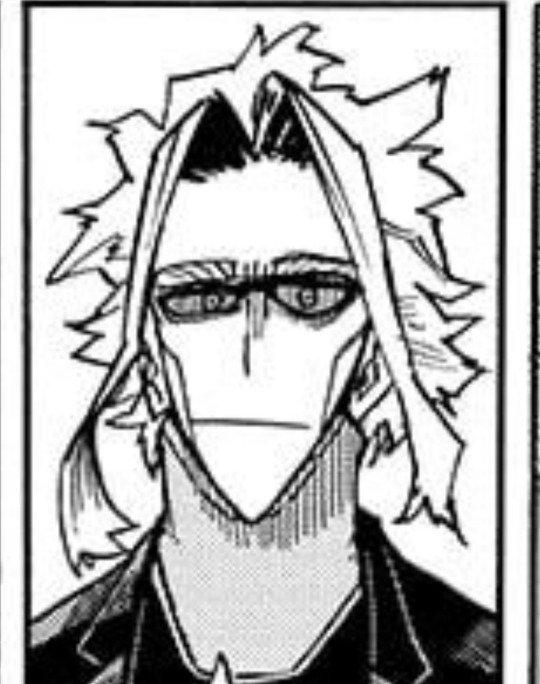
People who weren’t qualified to be heroes were even involved in this battle. And he thinks it unfair to hold such high standards when there are people who can still help, even if not at the extreme levels of the top heroes. He and Deku are proof of that!
In the last chapter several years later, we finally see Old Man Might! And his eyes-they’re so bright. ❤️
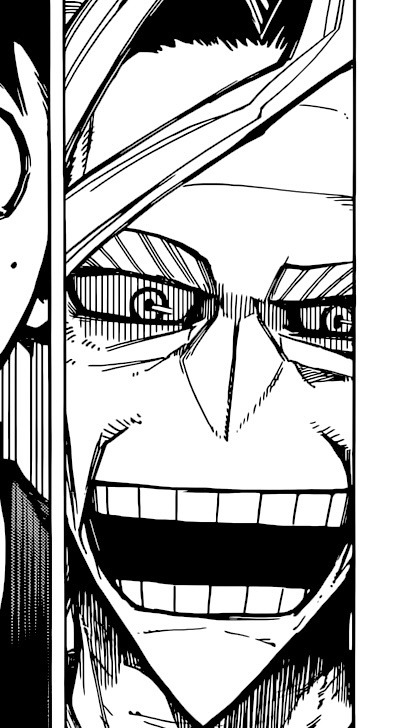
Of course they’ll always have a little shadow to them because of his sunken in appearance, but the tired lines under his eyes are gone. There’s not the black bags from pushing himself too hard, just the normal wrinkles that come with age.
This is Toshinori that’s been missing for decades. The man whose impossible weight has finally been lifted off his shoulders. He knows he can finally relax, he doesn’t have to be on alert or on call anymore. The world is safe without him.
He even found a way for Izuku to keep up his hero work with a suit similar to his own during the war (though most definitely suped up).
Finally, he can be at peace. His body, soul, and mind can finally begin to heal. He can work through all of the trauma he’s been stuffing down all of his life.
Finally, he can live.
#lover talks#ask me#I actually love how this ended#poor baby#I hope this makes sense#it sorta does for me#but I’m really tired atm lol#all might#toshinori yagi#yagi toshinori#izuku midoriya#bakugo katuski#Deku#great explosion murder god dynamight#lord explosion murder god dynamight#dynamight#or whatever lol#Nighteye#sir nighteye#toshinori yagi has depression#meta#my hero academia#mha#bnha#boku no hero academia#spoilers#bnha spoilers#mha spoilers#my hero academia spoilers#boku no hero academia spoilers
316 notes
·
View notes
Text
Izuku isn't losing his arms and here's why:
Okay so I know that we're all freaking out over that one manga panel, but we really shouldn't be.
Deku isn't going to lose his arms. It's all in his head.
Just stay with me.
First and foremost, look at the reactions from the characters when they join the battlefield. Specifically Aizawa:

What about this screams 'one of my students just lost both of his arms and may not end up having a future as a hero anymore?'
You would think that if Hori were to really go through with Izuku losing his arms, he would put more emphasis on the characters' reactions to make it more impactful, right?
To further reinforce this idea, we also need to consider the significance of Izuku's hands in Katsuki's arc. Whether you view their relationship as romantic or not, you can't deny that Izuku's hands holds significance to Katsuki. It represents the time when their relationship first fell apart, and I think in order to call their relationship fully 'healed' and complete Katsuki's growth, he's going to need to accept Izuku's hand again.
I mean, look at how foreshadowed the handhold is. There's no way they're not going to be holding hands by the end of the series. It's a necessity at this point.
And yes, you can argue that they already did hold hands, but to me that handhold didn't seem like the official one. It wasn't as impactful as it could've been. Now, while I'm not saying that the handhold didn't have any emotion to it, I feel like it's impact got a little diluted by Katsuki's revival. It wasn't the main focus. I think that the proper handhold is going to come later and be in it's own moment.
And, I mean, Izuku kind of needs his hands for that to happen.
So now you may be wondering, if Izuku hasn't lost his arms, then how do you explain what's happening to him right now?
Well, like I said earlier, it's all in his head. I think it's AFO fucking around with his mind.
I think AFO is somehow manipulating the vestige world and OFA mental connection he was with Izuku to make him hallucinate that he's lost his arms. He wants Izuku to crumble, and what better way to do that than to convince him that his dream is over and that there's nothing he can do?
I feel like this has also been foreshadowed in a way too. Take a look at this picture:
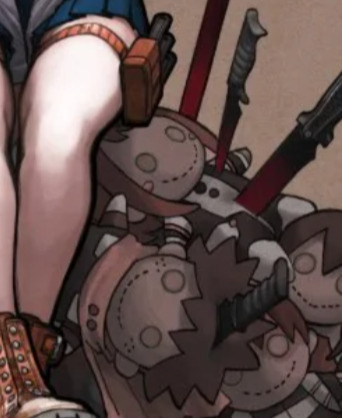
This image already foreshadowed Ochako getting stabbed in the chest, so perhaps it's also foreshadowing Izuku's fate?
The knife is in his head, so perhaps it's hinting at him being affected psychologically?
Also, the idea that it's only those that are connected to the vestige realm that can see the illusions that AFO is planting would be a great way to get Katsuki to be a part of the final fight too.
We already know that's he's going to be involved somehow. Hori himself said that the ending for mha was going to be better than the ending for Hero's Rising (the one Kats and Izu share OFA), and what better way to improve that than have Katsuki come save him from the mind fuckery?
I also think that finally having Izuku and Katsuki fight side by side has been foreshadowed for a long time, and if that really were to happen, then there's no better time for that than the final fight.
Also, Katsuki's really the only one that can save Izuku right now if my theory were to be true. He's the only character that fits the very specific requirements that Izuku needs (being connected to the vestige realm, and also having a willingness to save/help Izuku).
Speaking of, Katsuki being connected to the vestige realm was a shock for us all, and it doesn't make sense for why Horikoshi would show us such ground-breaking information if he didn't plan on using it later. This has to be the later. There's no other case where I can see Katsuki's connection to the vestige realm being implemented into the story again other than this.
So here's the TL;DR:
Izuku is being mindfucked by AFO and Katsuki is going to be the one that brings him back to reality
#bnha#mha#mha theory#bnha theory#mha manga spoilers#bnha manga spoilers#my hero academia#boku no hero academia#bakugou katsuki#katsuki bakugou#izuku midoriya#midoriya izuku#one for all#all for one#mha predictions#bnha meta#mha meta#bkdk#bakudeku
488 notes
·
View notes
Text
it's a story about hands (reprise)
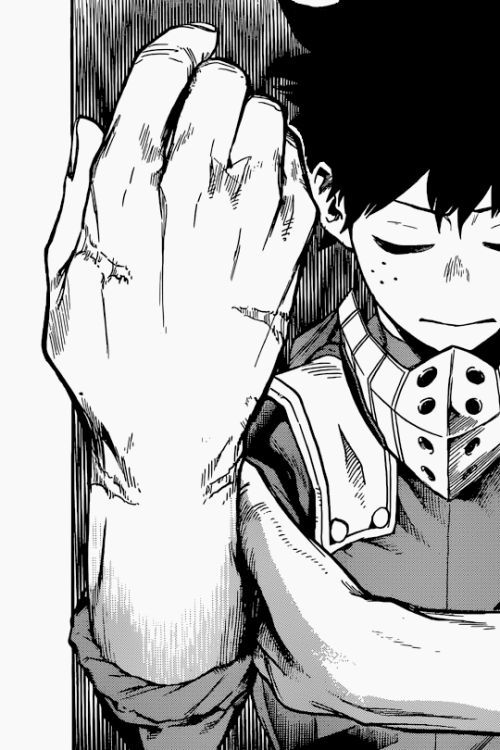
Yeah, okay, today's the day.
I gave my blog that title for a reason, you know, and it has loomed over me for years because the hand motif is absolutely everywhere and you could go on about it forever.
Maybe that's something I'll never actually attempt to do, but this chapter, we reached a breaking point.
Before I continue, I need to give a big, big disclaimer: I do not have a physical disability, so I'm not able to speak about that from the standpoint of representation as a first-hand perspective. I have at least listened to enough disabled people to know that fictional characters who become amputees only to miraculously gain their limbs back is, um, a trope. Disabled people in general being "healed" is a conception we would really prefer to avoid here. Not to call people out, but I don't think we're giving enough space to acknowledge that.
I don’t feel comfortable making the judgement call about what should happen. I’m leaving that open. I also don't want to downplay people's emotional reactions. Honestly, I don't know if I can accurately define the line between acknowledging real pain vs. ableist pity. But I’d like to talk about the possibilities of what could happen. Other characters have definitely gotten permanent disabilities as a result of their hero work, or even just the side effects of their quirk. But, for better or worse, I don't think this case is really about representation. Not that Horikoshi won't do that justice. He might. What I'm saying is that's not his purpose for having Izuku lose his arms. It's meant to be symbolic, so we can explore what it means. The other thing I’m keeping in mind here is that Horikoshi is notorious for playing with our expectations, like, alllllll the time. I mean, just take a few chapters ago for a classic example. Eri appeared at the end, and we all assumed she was about to take some sort of action to save someone with her quirk. Then, immediately following, we were given an explanation for why that wouldn’t be happening. And now it’s clear he wanted to do that “fake out” not just as a silly cliffhanger prank, but specifically so we would know not to suspect that Eri could be the miraculous solution to Izuku’s loss of his arms. Rest assured, there is no easy way out of this.
The expectation at play in this particular instance is an old one. It’s very understated, but its subtext has burned so brightly, you’d be a fool not to notice it. It sits with anticipation like one half of a call and response. Man, I was so certain. Lots of people still are. I was really looking forward to printing the panel where it happened onto a t shirt and wearing it proudly. All the hand motifs in this story radiate thematically from a single moment, the one that started it all for Izuku.
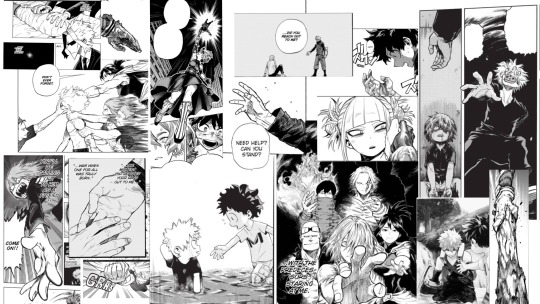
It raises all kinds of questions about the act of saving, who needs saving, why, what does it mean, what are the dynamics of power, politics, honesty, exploitation, compassion, pity, disdain, sacrifice. Katsuki has dealt with many of these since he first rejected Izuku’s hand. While Izuku was the one who was convinced Katsuki would keep on rejecting him…
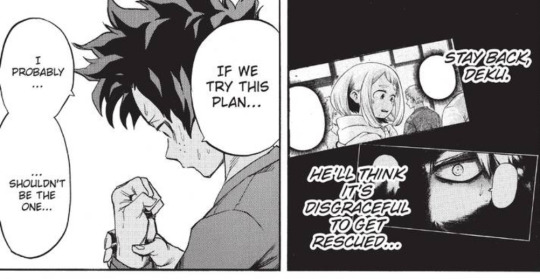
…Katsuki was the one who kept that moment in his mind all these years and eventually came to regret it.
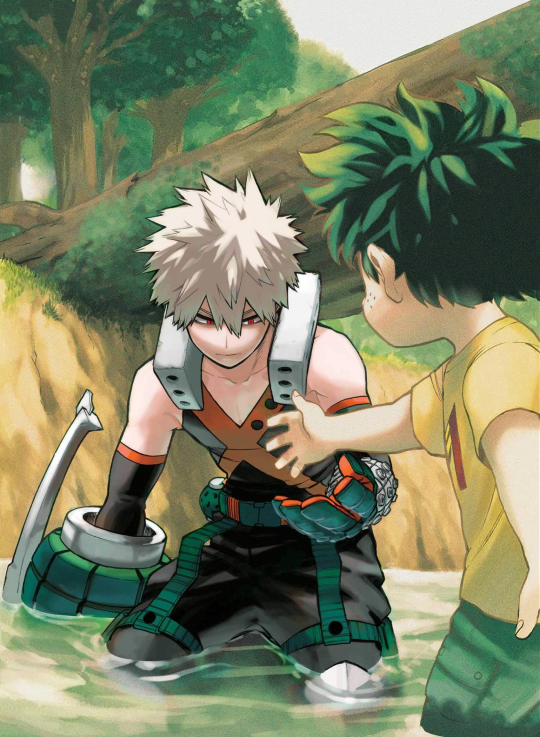
Katsuki is the one yearning for that hand-hold, the one who has imbued it with so much more weight than it ever originally had. Izuku, in contrast, does not allow himself to dwell on what he wants. To illustrate this difference, we need to look at another piece of foreshadowing:
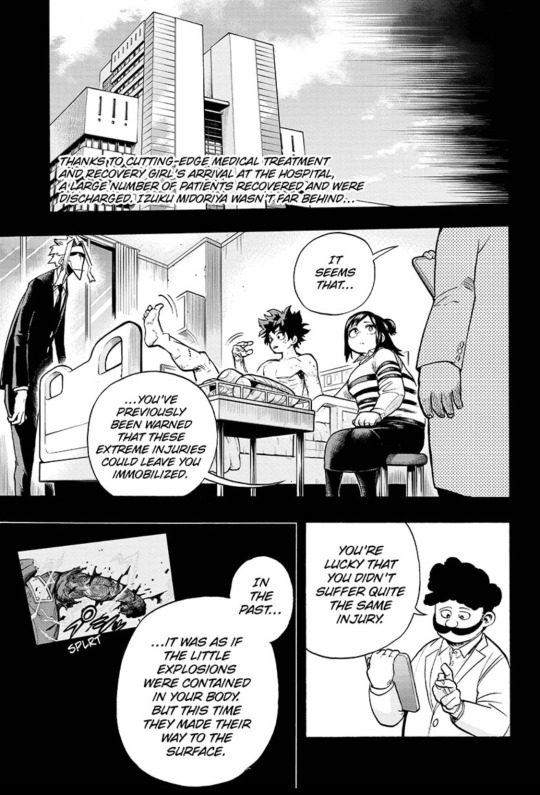
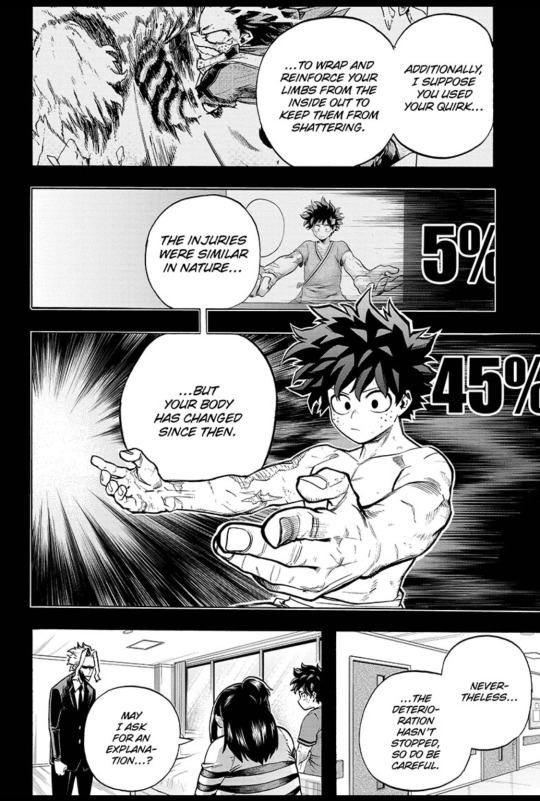
Ugh, do y'all remember when lots of folks were complaining about how there never seemed to be actual consequences for Izuku's destructive treatment of his own body? I don't blame them, I was concerned and confused about it too. There were several "fixes" along the way. Recovery Girl healed him, but left a physical reminder. Then he started training to fight with his legs… sometimes. Then he got support items. All of these were unsatisfying non-conclusions because they didn't present Izuku with a lasting enough impression to change in a meaningful way. They didn't address his core, his origin.
Of course, that all changed this chapter. Now it looks like our frustration was inflicted intentionally. With the current context in mind, all of these moments look more sinister, like this day was always gonna come because they kept putting bandaids on a deep emotional and psychological wound.
The problem is pretty much spelled out for us here:
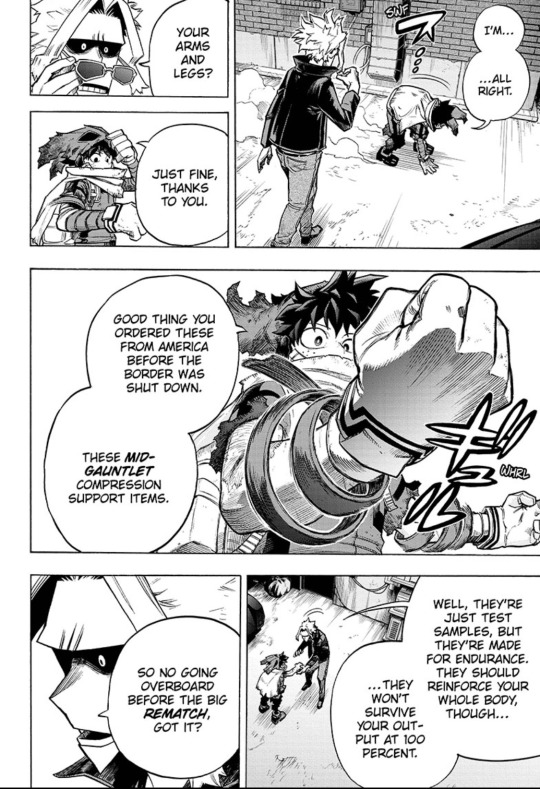

As Katsuki put it, he just doesn’t take himself into account, ya know? He doesn’t care what happens to him. And he lies about it, to keep others from worrying, to keep them safe. To keep them from returning the favor and putting themselves in harm’s way for his sake. His motivations are noble,
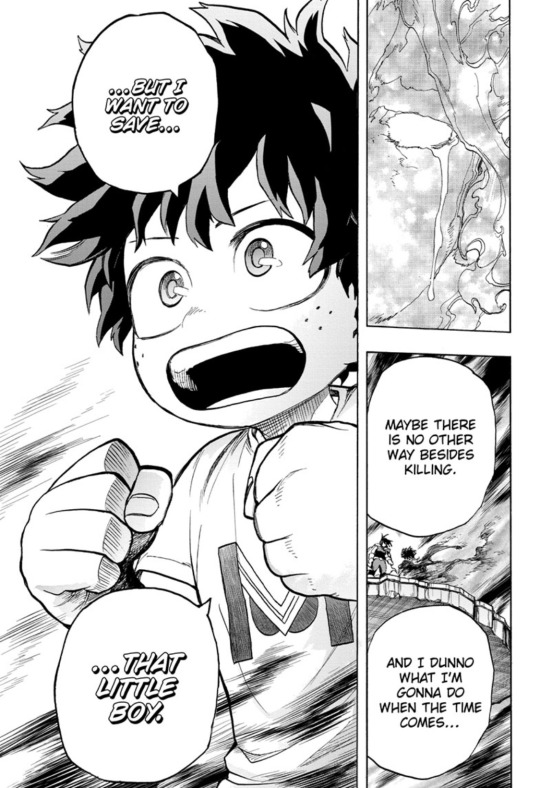
…but what about the little boy inside Izuku? Who saves him?
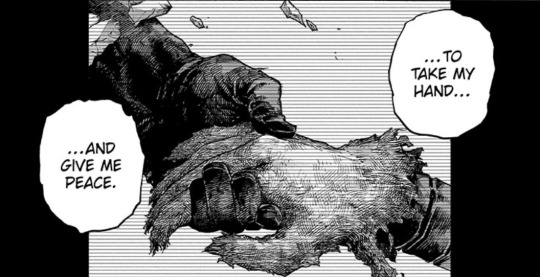
This is all about Izuku giving himself up to the point that he literally has no more to give. The thing is, I bet he saw this coming. He knew his limits and decided to keep going anyway, because his personal safety and wellbeing are not important. Now that way of thinking has come back to bite him because the fight isn’t over yet, and he’s already made his sacrifice. So now we know who will be more distraught over this. Not Izuku—Katsuki.
It’s not about Izuku becoming disabled, it’s about how Katsuki wanted to use the intertwining of their fingers to communicate that he would never let go. Never stop valuing him most. Never let himself make the mistake of rejecting him again. Never let Izuku be so reckless with his life. To say: “we are in this together.”…if only Katsuki believed he deserved to be able to say such things. To reach out his hand would have been the ultimate way to simply imply them and let Izuku be the one to decide. Then, to feel their hands clasped together would be more than either of them dared hope for, but so beautiful, so right. A moment they’ve waited their whole lives for.
Yeah. That’s what we were expecting. We’ve been so comfortable. Horikoshi gave us all the signs. He tempted and teased us over and over. BUT. You know he does this thing were he gives us a desirable, completely plausible and simple thing to look forward to, and then he snatches it away. And THEN he replaces it with something much better, something we were not expecting at all because it seemed too good to be true. That’s exactly what happened when Himiko snatched Izuku away, and we were robbed of the chance to see him and Katsuki fight together. In hindsight, though, I’m glad things went a different way because now there’s so much more depth and angst on display. Likewise, in the present moment, we may consider how, as one door closes, another opens.
As wonderfully meaningful as the hand-hold would have been, perhaps it is still too simple a resolution for Izuku, for his and Katsuki’s relationship. Tbh, it could have been done like 100 chapter ago. At this point, there’s so much more potential. There are a couple of ways it could go. If Izuku stays armless, Katsuki will be forced to use other methods to get his point across. He’ll have to do something else, or say what he means, or both. Yes, I’m talking about what you think I’m talking about. If I say it, I just might jinx it (lol), but I mean it. I’m being serious. Either way, if Izuku did get his arms back in the end, I’m sure that it wouldn’t be an easy fix. It would be hard-won against Izuku’s self-destructive mindset, and/or by Katsuki’s conviction. Again, I say this knowing it is not meant so much as a representation of disability, but as a representation of Izuku’s greatest character flaw taken to the extreme. I know this might sound harsh, like, hasn’t he been through enough? I get that, but… I’ve said it before and I say it again: Izuku is stubborn as hell.
I wish I had a resounding final note to end this on, but I kinda don’t. I’m not sure what’s best. Now we just have to wait and see what Horikoshi has in mind.
#lin speaks#bnha meta#bnha manga#bnha 419#mha#boku no hero academia#my hero academia#midoriya izuku#bakugou katsuki#bakudeku#bkdk#dekubaku#dkbk
412 notes
·
View notes
Text
Oh nothing, just thinking about the fact that Katsuki smiles the widest in battle when he feels like he’s competing/catching up with Izuku but stops smiling when Izuku’s in danger/is forced to think rationally, outside of the fantasy that everything Izuku does is to compete with him as well. Thinking about the fact that he has genuine fun and performs his best while thinking about surpassing Izuku, in the essay I’ll-
#also the ‘for the rest of our lives’ scene hits so much harder when you think about the moments leading up to 285#and 322#Ima write a meta about it cuz it’s stuck in my head#idk how anyone can read anything after ch284 and not be convinced that Katsuki’s in love with that man#also Izuku does the same thing but when it comes to helping people while also doing it while he’s mimicking katsuki#bakudeku#bnha#bkdk#bakugou katsuki#midoriya izuku#i love them so much
261 notes
·
View notes
Text
All Might rose in a time of fear, when people needed to believe that things would turn out alright in order to move forward, and so he became a symbol of peace—his strength was a comfort to everyone. Because of him, society was able to come out of a state of chaos and stabilize.
But Midoriya was born in the era of complacency that followed. If he became the same symbol of peace that All Might was, then society would stagnate. Another strong OFA user would just reassure society that the heroes have everything handled, that they don’t need to intervene, and that they didn’t have enough power to help even if they wanted to.
That’s why his loss of OFA (a terrible thing in itself!!) is going to work out for the ultimate good of everyone. It actually frees Midoriya to wield the power he was born with—the ability to inspire other people to act. I don’t think it’s an accident that he was quirkless in his rising chapter. When people see Midoriya running to save, even without any power, they loose any excuse for complacency they had. They feel compelled to do the same.
That power—the connection of hearts that formed OFA in the first place—is greater than any quirk. It’s what makes Midoriya the greatest hero.
#bnha#bnha spoilers#bnha manga spoilers#bnha manga#midoriya izuku#all might#one for all#bnha meta#mha#mha meta#my fanworks#also he’s gonna do fine in combat still#given his sports festival obstacle course performance#I think he can at least hold his own on the level of invisible girl and tailman
313 notes
·
View notes
Text
The Powerful Theme Behind BNHA’s Nuanced Ending
As I’m posting this we only have one more chapter of the manga and I don’t know how the ending is going to exactly play out, but I do know one thing. The deaths of Toga and Tenko were not in vain, and the author is still trying to give readers hope while also still maintaining some realism and bitter-sweetness in his messaging. Therefore, this is what I think Horikoshi is trying to tell his readers, especially the young people who have their whole lives ahead of them to make a difference on the world:
I see how this theme, the one that’s been built up throughout this manga yet simultaneously feels like it’s coming out of left field, is one of those themes that is a hard pill to swallow. Basically, no matter how hard we can try and push to do good and help others/make the world a better place, we’ll often fail again and again. A lot of bad things can happen, society can choose to remain apathetic, and it can seem like nothing’s ever gonna change because you just put all that hard work in towards the future for nothing. However, even if sometimes you can’t save everyone or society keeps trying to push issues under the rug, that doesn’t mean we should give up trying to fight for social issues we care about. We might never get to see the perfect world Deku and Urarak dream of, and Tenko and Toga may be gone, but their fight for a good and accepting world will someday be worth it cus their actions do have weight by showing that redemption is possible, even if no one has seen it except them. Young people like them just have to make sure to leave their mark so that others can follow.
My Hero Academia is about how we all can become the greatest hero, not by magically destroying the world’s problems and apathy overnight, but instead by continously reaching out a helping hand to people who might not initially seem like they want it.
#Bnha#Bnha meta#mha meta#mha#boku no hero academia#my hero academia#bnha spoilers#bnha analysis#class 1a#mha deku#mha ochaco#mha analysis#bnha deku#bnha ochaco#deku#uraraka ochako#ochako uraraka#izuku midoriya#midoriya izuku#shigaraki tomura#tomura shiragaki#toga himiko#himiko toga#tenko shimura#shimura tenko#shigaraki#toga#mha shigaraki#bnha shigaraki#mha toga
241 notes
·
View notes
Text
I just need everyone to understand the reason I know Izuku's self-sacrificial traits are not condemned by the MHA narrative is BECAUSE Katsuki admires them. Katsuki is NOT slowly coming to fear Izuku's self-sacrificial nature over the course of the story and growing protective of him for it; Katsuki's coming to the realization that those self-sacrificial traits are what he was always awed by and afraid of. It's the way Izuku is--and that's what Katsuki wants to be like.
That's why he felt like he lost at the sports festival, because Izuku's self-sacrificial nature achieved the most heroic outcome (Izuku sacrifices his pride and the advancement of his hero dream to make Shouto into a better hero than he ever would've been if Izuku had not saved him), and Katsuki could not match that AND HE KNOWS IT.
That's also why he saves Izuku in the Paranormal Liberation War, because he recognizes what an amazing hero Izuku can become and in the process learns to express that same self-sacrificial trait he never knew he had. He's protective of Izuku's dream, the ideal Izuku represents. The whole "One For All may be a cursed power, but--" line was probably meant to end with "but it's his power, it's allowing him to be a hero, it's allowing him to have his dream." IT'S AN EXPRESSION OF HIS ADMIRATION OF IZUKU'S HEROISM AND HIS DESIRE TO KEEP IT ALIVE.
I just need everyone to knowwww.
#katsuki bakugou#izuku midoriya#meta#i just have a lot of feelings after a crash nap ok#anime only friendly
346 notes
·
View notes
Text
My Hero Academia - How NOT to do an Open Ending
In 2022, the American animated series Amphibia ended with an open ending that left all of it's ships up in the air, and the question of where the main characters would go from there up to the reader.
That might be a rather weird way to open an essay about how My Hero Academia failed, but the reason I do so, is to illustrate a point.
Namely that there is a way to do what Hori tried to do with MHA right.

Amphibia ending has the main human trio of that series reuinte after a long timeskip, with all 3 of them having found their passion in life and built careers for themselves, and while there are some suggestions that Sasha and Anne are a bit closer than what might be apparant on screen, it ultimately left the situation of their romantic relationship at this point, and from there on, up in the air withouth confirming or denying anything, beyond the fact that they for whatever reason drifted apart in highschool, but have come back together again at this point in time.
It left you with enough pieces to figure out the specifics, and how you can understand how things got from one point to another, while still giving all the characters a satisfying payoff, continued the shows themes, had no real plot holes, and wheter you ship any of the characters in question or not, it didnt ultimately matter for the quality of the ending.
The fun part about an open ending is that there is room to speculate, so long as it manages to balance all of the above.
A story does not HAVE to end on the main characters hooking up. it does not have to end with tying every single character up in a relationship and showcasing the beginning of the next generation. It does not have to have a definite ending that gives all the answers to be good.
That is one way to end a story, but it's not the only one.
There certainly are stories that NEED to end like that to be good, stories with a greater mystery, or revenge tales, or who's entire story was about one, specific romantic relationship are shit endings if they ultimately end on an open ending withouth answers.
within the context of MHA, Hori managed to weave this balance very well with it's villains.

The story of the Todoroki family in particular has all the definite endings, and tells us where all the players ends up... but it also leaves the possibility, and question of wheter or not dabi ultimately managed to make peace with his family or not up in the air.
This is a good, satisfying, tragic ending.
Spinner and compress both end up in jail for the rest of their lives, but Spinner resolves to write a book, that for better or worse will tell the league's version of the story. It's not AS good an ending as the above, but it still works just fine.
Clearly Hori CAN write a good open ending that still gives closure.
Which is why it's so baffling that MHA 430, ends up doing EVERYTHING WRONG as far as an open ending possibly could.
It has no closure, it has plot holes aplenty, it manages to leave the question of will they or wont they unanswered, not by being ambigious, but by telling us, in the most unintentionally agressive manner possible that it did NOT happen, and most damningly of all, it shits all over the Story's themes.

MHA ends with the cast all grown up in an "and the adventure Continues!" ending, similar to justice league Unlimited.
That's not a BAD way to end it... The problem is EVERYTHING ELSE in this chapter.
Because we learn WAY too much in this chapter. the gaps in the timeskip is filled... but not in a good way. instead in an infuriating manner that pisses you off if you actually starts to break it down.
Let's start with Izuku being forgotten.

So i have seen some people try to shut down criticism about the fact that Izuku didnt win fortune or fame, by noting that from the thematic point, being a hero was NEVER about that from Izuku's point of view.
And that is true... but this argument misses the bigger and more obvious problem.
The story REFUSES to tackle this from that angle.
As many have pointed out, this is a BAD outcome ending for Izuku.
He returned to being quirkless, he had to settle for a job that wasn't being a hero, he has been mostly forgotten after his one big highlight, and his friends have effectively begun to move on.
And he does not care.
At all.

Hell, a 14 year old izuku who for one brief moment gave up on his dreams to chase a more realistic future, has more genuine and mixed emotion and mixed feelings in one shot, than Izuku has about actually living through a much more bittersweet scenario.

Hell, the one moment Izuku has when he looks genuinely down in this chapter, is when Aizawa admonishes him for not being strict enough with his students.
Basically the premise here is sound. Izuku ended up in a bad personal ending to set up the return to actual heroics at the end of the chapter... And that could have worked if it committed to that.
If he was portrayed as actually having regrets about his lot in life. you know, the same thing All Might's ENTIRE STORYLINE was built around!

MHA has ALWAYS been a human story that confronted the fact that people had regrets, and problems, and they need to be honest about them to deal with them.
To not bottle everything up inside and pretend the problems arent there.
For the story to end, with Izuku doing EXACTLY THAT is a slap in the face that goes EVERYTHING this story has preached about how you need to communicate with the people around you. the entire point of chapter 429, the CHAPTER RIGHT BEFORE THIS ONE!

Then of course there is the whole "Everyone Growing apart" thing too.
Now, it's not as bad as the early translation made it seem, but the point still stands that despite the entire chapter right before the end then emphasises how everyone went their separate ways.
This chapter COULD have shown us moments where Izuku is still in contact with the rest of his class, but it does not. instead it emphasises how distant he is becoming from the rest of his former friend group. He is the lone one out, the one guy who seemingly is no longer in regular contact with the rest.

The reason for that, is that Hori wanted to make the moment where he returns to the fold that much more impactfull... but it does not work, because it basically tells us that none of the class was able, or willing to make the personal sacrifice to keep in regular touch with him during those 5 years.
But FAR more egrigiously, and spitting in the face of the Theme of actually communicating and talking with the people you care about, is HOW Izuku gets back into the game.

Apparently they spent the last 5 years pooling their money to finance a high tech suit for him to fight crime in.
And i get it. I get what Hori WANTED to do with this. He wanted to show "See, Class 1-A didnt forget Izuku after all, they still love him!".
Thats the intended message.
But the problem is, it does not work. and in fact, not only does it NOT work, but it completely goes against EVERYTHING that the story has been trying to preach for the entire 10 years of it's run.
The rest of class A never told Izuku about this. ever. Why? apparently because they wanted it to be a surprise. So they just let him go on with his life for 5 years, all while none of them really bothered to keep in regular contact with him.
There is... so much wrong with that.
But before going over the way it just hammers in the point that actually talking with the people you love isnt important after all, let's go over how this entire stupid plan could have backfired SO badly on the part of class A. Hell, it kinda did actually, if not quite as spectacularily as it could have.
What if Izuku had gotten married and moved overseas during this period? What if he had gotten married in Japan, but his entire family dynamic and plans had revolved around the fact he had a job that did not require moving around much and so got to spend a lot of time at home? Hell, even within the context of what actually Happened, U.A is still going to find itself suddenly short of one teacher who his classes relies upon, if he actually wants to go pro for real.
There are so many ways this stupid 5 year scheme of secrecy could have backfired, and it does not take a genuis to be able to see them.
basically the entire class planned out Izuku's life ahead of him withouth telling him anything about it, withouth giving him the context or preparation for how to plan his future with it in mind, and how none of them seemingly cared about how this might upend his actual personal life.
And thats just the logistical issues.
Morally speaking, this just repeatedly hammers in how this final chapters just completely abandons the themes of how you need to actually work, talk and discuss your personal matters and feelings with the people around you.
1-A did none of that.
They let their relationships with Izuku cool, when they didnt have to, seemingly with the idea that it didnt matter in the end because he'd join them anew as a hero later anyway, and they could catch up then.

Which leads me to discussing the one, actual ship who's ending actually DID matter from a storytelling perspective.
Izuku and Ochako.
Now i have seen so many bad takes across the web from the people who are happy this did not happen, or argue that it does not matter.
But the brutal truth is, it does.
And the reason it does, is not because Izuku HAD to end up with Uraraka, or even that they had to be together in the final moment of the series.
It's because one of the longest running stories of this manga had NO ENDING, NO RESOLUTION, and rather than that, it wants to suggest it might still happen anyway... Despite unintentionally KILLING IT in the most infuriating way possible.
Out of all of the cast, it is Uraraka's character who is butchered by this stupid 5 year plan, to the point it even taints her entire new character direction at the end.
Uraraka ends the story having reformed the Quirk system for people growing up, helping those with difficult quirks get past mental problems... But just all the rest of her class, she chose to neglect her relationship with Izuku under the seeming thought process that she could patch it up later... Or that she could finally confess her feelings.
I'll let Shigaraki speak for my feelings on this way of thinking.
"You heroes hurt your own families just to help strangers. You heroes pretend to be society's guardians. For generations, you pretended not to see those you couldn't protect and swept their pain under the rug. It's tainted everything you built. That means your system's rotten from the inside with maggots crawling out. It all builds up little by little over time."
The intended message of MHA is a refution of this... but in this final chapter, Shigaraki's words ring true, at least as far as class A is concerned.
As they became Heroes, they neglected the one amongst them who needed the most support and instead went off to, as shigaraki put it, Help Strangers.
They pretended that Izuku's situation in the moment did not matter, because in the long haul it would all be worth it.
And just like their predeccessors, it taints everything they do.
But Uraraka most of all. If you ignore the romance angle, she has started a massive program to help strangers in need... while also neglecting and frankly mistreating someone she loves and cares about her who needed her support in his weakest period.
If you do take Romance into account, it gets even WORSE, because then you have to accept that Uraraka ultimately rejected the message that she preached with Toga, the thing that got the blonde girl to turn coat for her.
She in the end did not manage to live a life where she actually was able to do what she wanted to do, and instead remained the exact same wishywashy girl who refused to actually be open about her feelings.
Instead, she, in her final shot of the series, is in the exact same spot she was back then. A girl who would forever pine after Izuku, but never be able to open up about it.
Which would be a bad enough way to end her character on... But then when you take into account that she also participated in the 5 year plan, and there is nothing to suggest she kept in touch with him more than the rest, just makes it so much worse.
I have said before that with this ending, Uraraka's love story was an objective waste of time, and i stand by that.
Hori didnt have to end the series with Izuku and Urarak married, engaged or obviously in a relationship, but by refused to actually make it happen, and lumping Uraraka in with the entire rest of the class, he instead did something way worse.
He made it abundantly clear that regardless of what Uraraka's feelings on the matter, the relationship to Izuku was not something special. She was NOT his Hero in the moment when he actually needed one.
Neither as a friend, or as a love interest.
Her actions tainted everything else.

And of course, there is the big plot hole of this chapter.
The single biggest, and most obvious hole that is just gaping through it, that for this story to work you have to completely ignore.
Namely that 1. All Might is one of the richest peoples in the world. Class A should not have had to actually fund Izuku's suit. All Might could, and SHOULD have done that all on his own. and 2. That this tech EXISTED 8 YEARS AGO!!!!
All Might's armored suit made him one of the most powerfull figures in this entire series.
Sure it was a bit experimental, but it WORKED! it was not some unstable prototype that coudl explode at any moment, it would have worked just fine as an actual permanent power up!
For this entire stupid 5 years of Sidelines Izuku to work, you have to just PRETEND this massive hole does not exist.
And it's not a small hole that you can justify that the characters didnt think about it. It's there, and it's MASSIVE.
The only reason it's not talked about as much as all the rest is that while this is the big Material problem of this chapter, everything else is so much worse because it attacks, destroys, and taints pretty much every theme MHA had over the course of it's long run.
---Edit---
Apparently there is a throw away line in the Trivia section of Volume 39 that All Might apparently spent almost his entire fortune on his Mech suit.
Meaning that while this isn't quite the plothole I assumed it was, it IS still TERRIBLY communicated within the story itself why All Might didn't just fund Izuku's suit themselves.
---
The themes that more than anything else was what set it apart from every other battle manga that ever existed. The Human themes of actually talking to the people around you that made MHA a special story, far more than it's superhuman battles ever did.
That is why so many people are pissed off about it.
It's also why MHA is such a textbook example of how NOT to do an open ended story.
Hori could have kept the details about Izuku's life, be it his personal or proffesional life incredibly vague, beyond the basics... but he choose not to, and instead peeled back the curtain... but rather than showcasing depth, it just made the whole thing fall apart by giving us the specific details that we did not need, and which pretty much tainted the entire ending down to it's core... All completely unintentionally.
He didnt have to show that Izuku had NO specific remaining bonds with any single members Class A that were still more important to him than the rest.
But he did.
He didnt have to go out of his way to show that Izuku was completely forgotten by society at large.
But he did, and subsequentially did not actually choose to explore that.
He didnt have to show us deep, long, internal monologues from izuku's perspective where he is cartoonishly at ease with his lot in life.
But he did.
He was too specific and detailed about the things he NEEDED to keep vague, and not specific about the details that we actually needed to know, and so it all collapses in on itself in a mess of broken Themes and morals, and shattered logic, and above all else, he managed to carelessly and unintentionally cheapen every single relationship Izuku formed with the rest of his classmates over the course of this story.
#my hero academia#izuku midoriya#ochako uraraka#meta analysis#endings#open ending#izuku x uraraka#izuocha#bad ending#class 1 a#mha#mha 430#chapter 430
169 notes
·
View notes